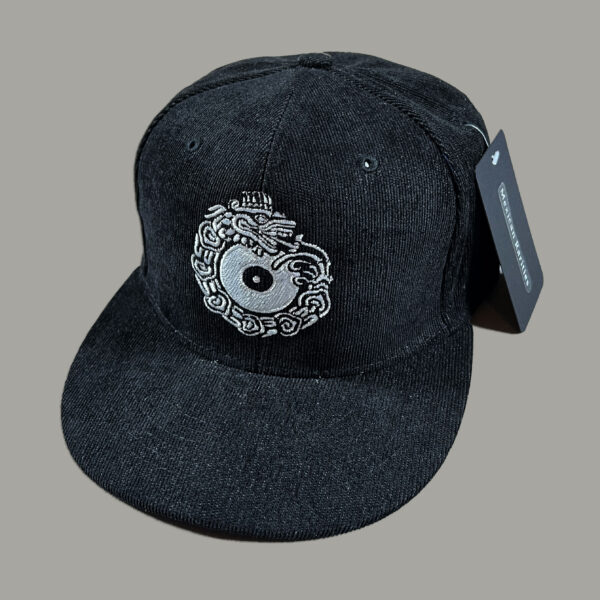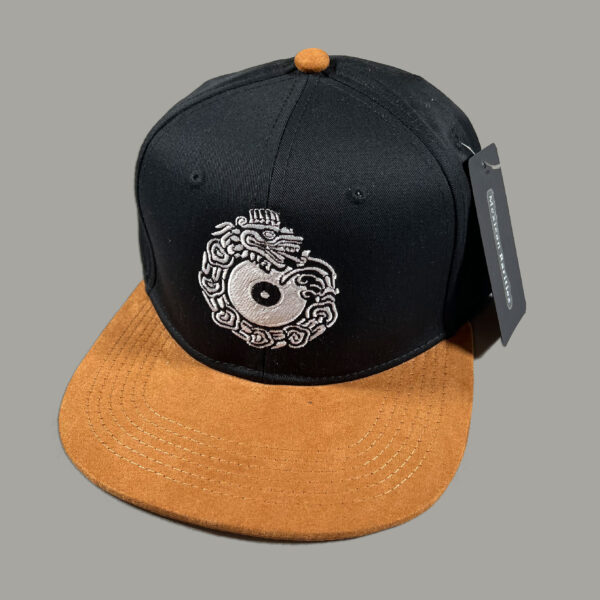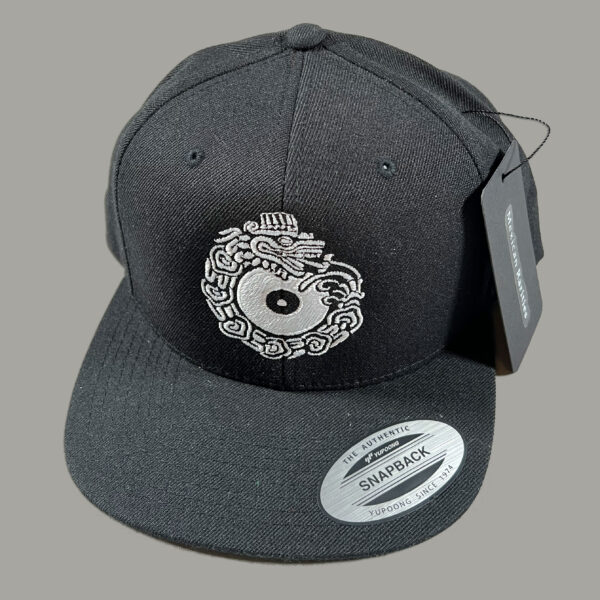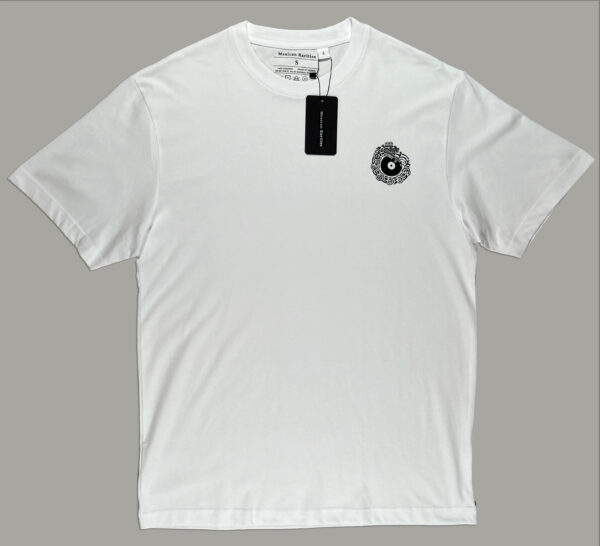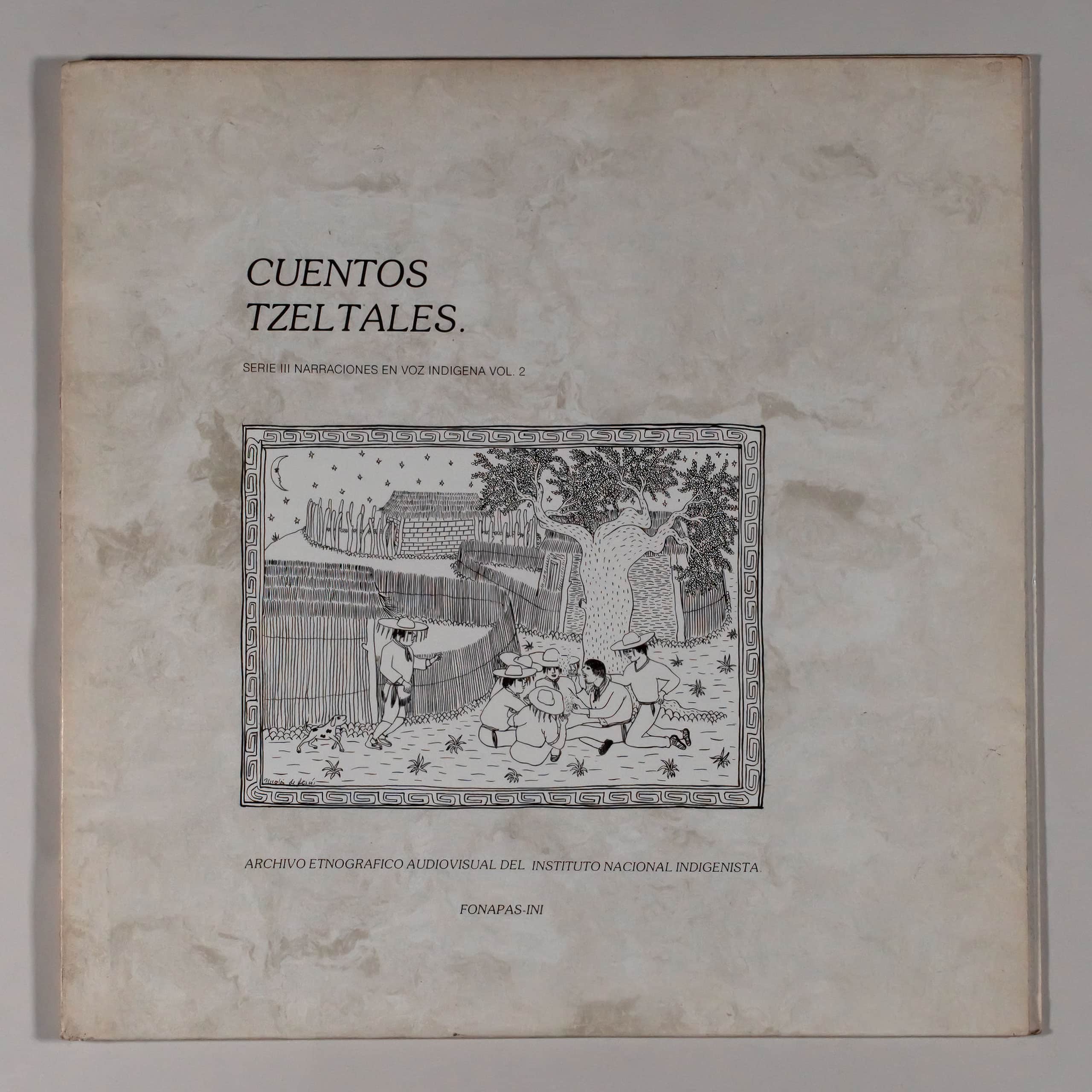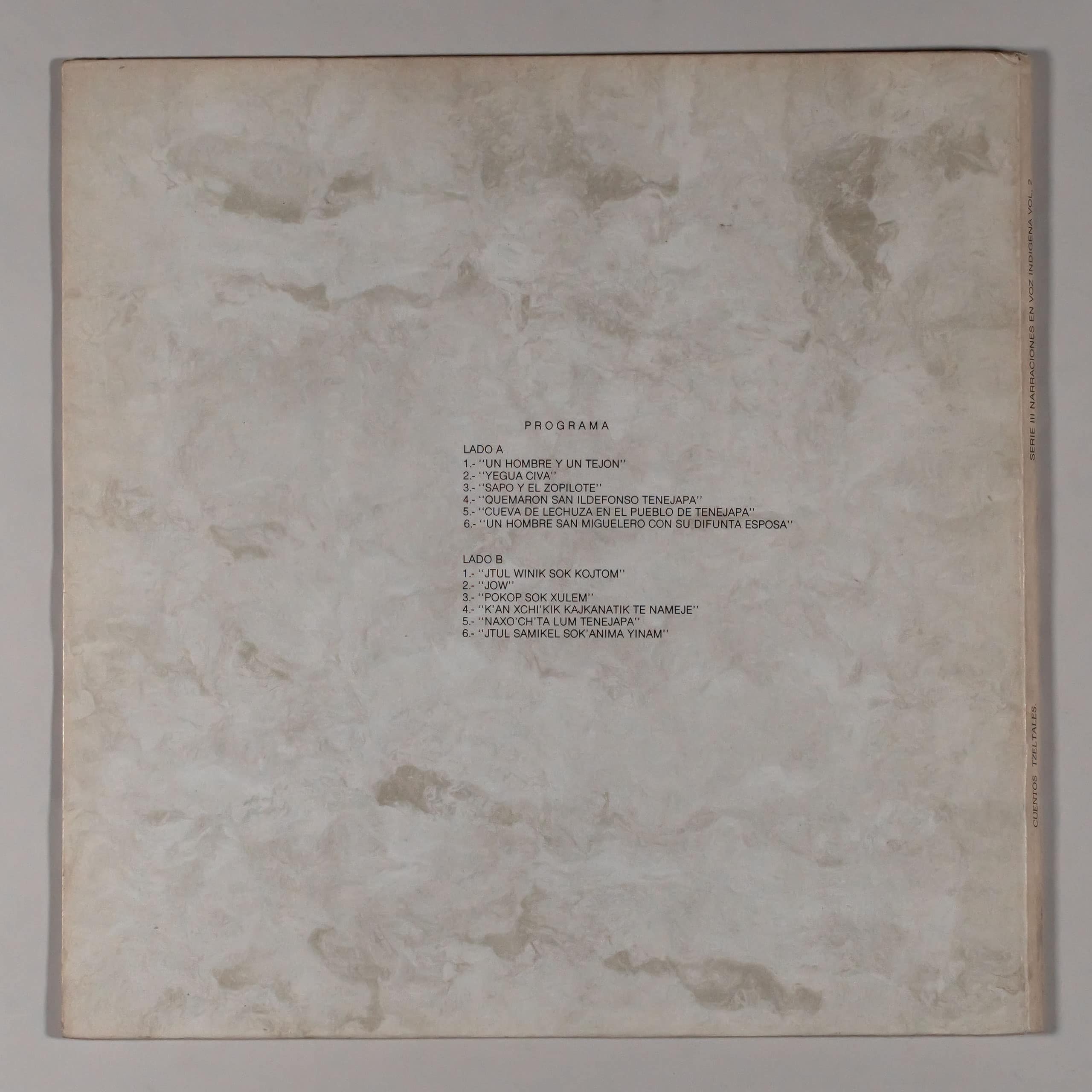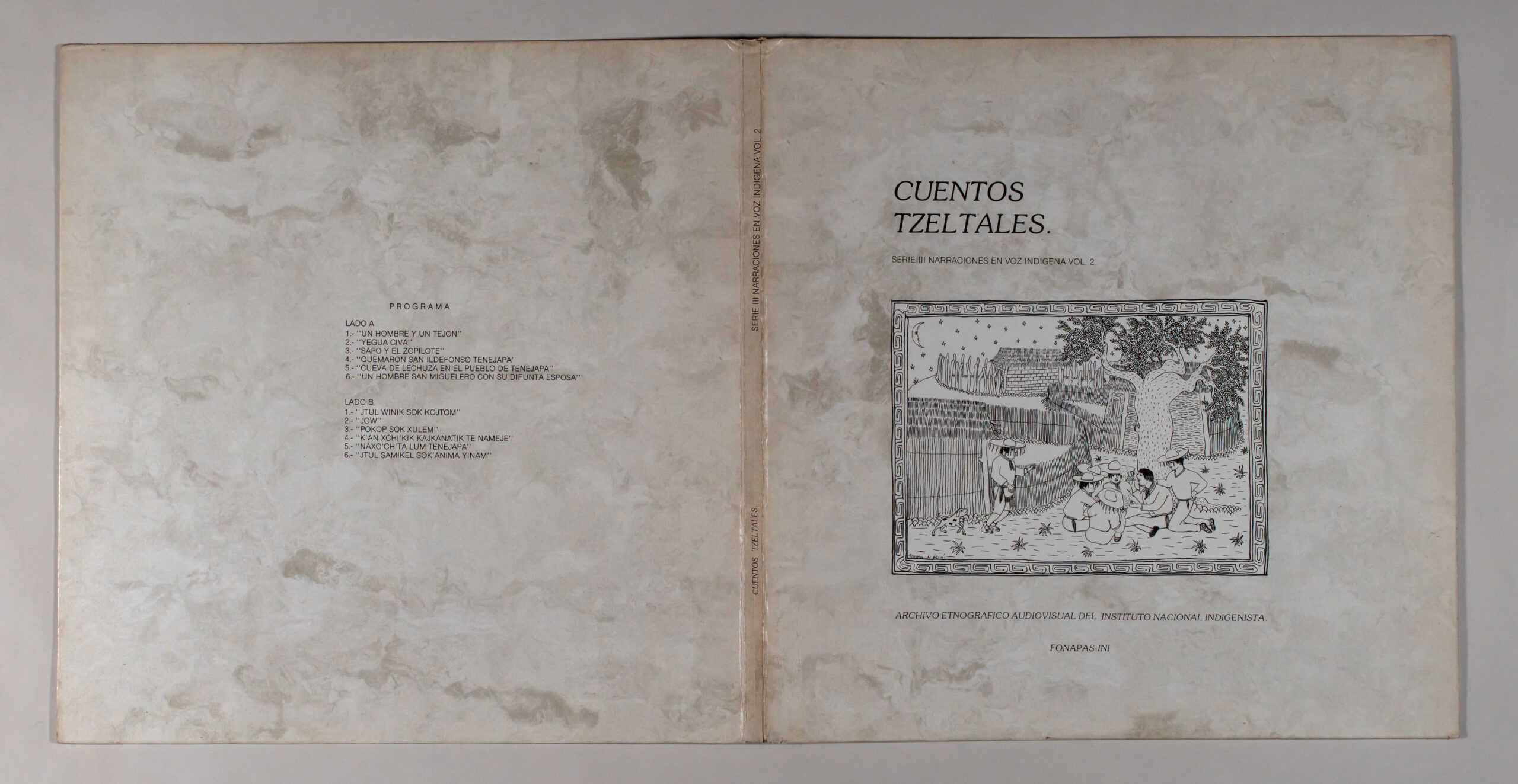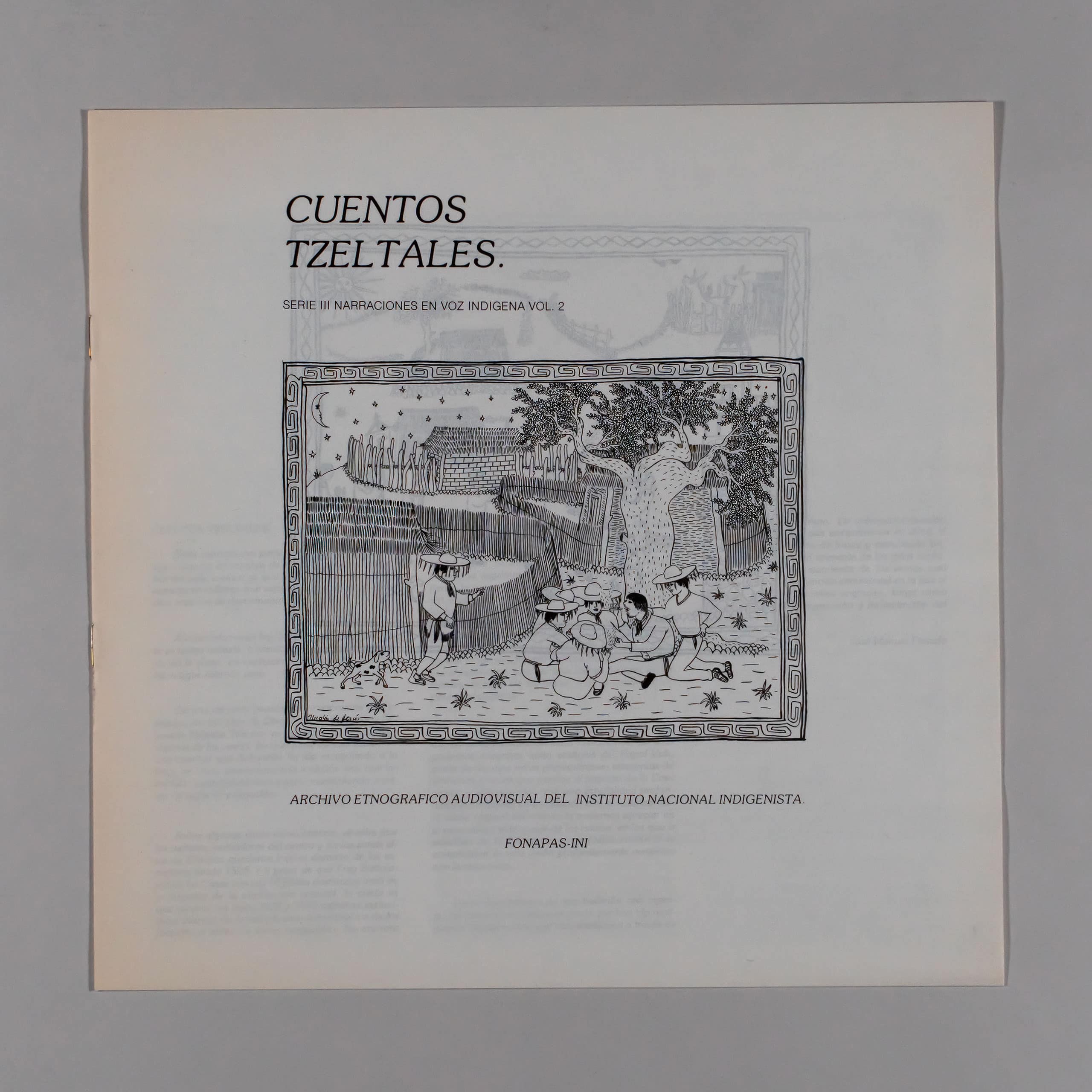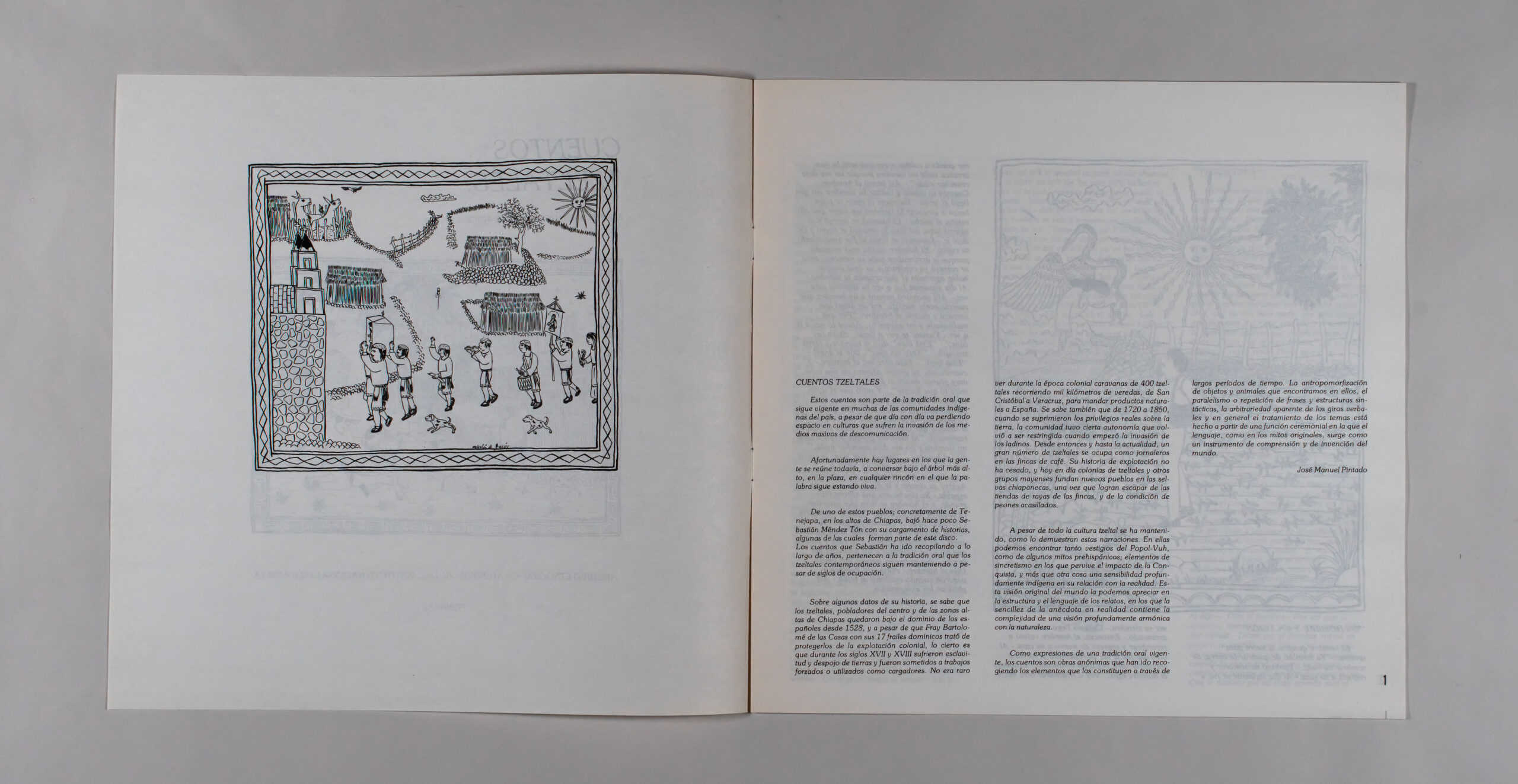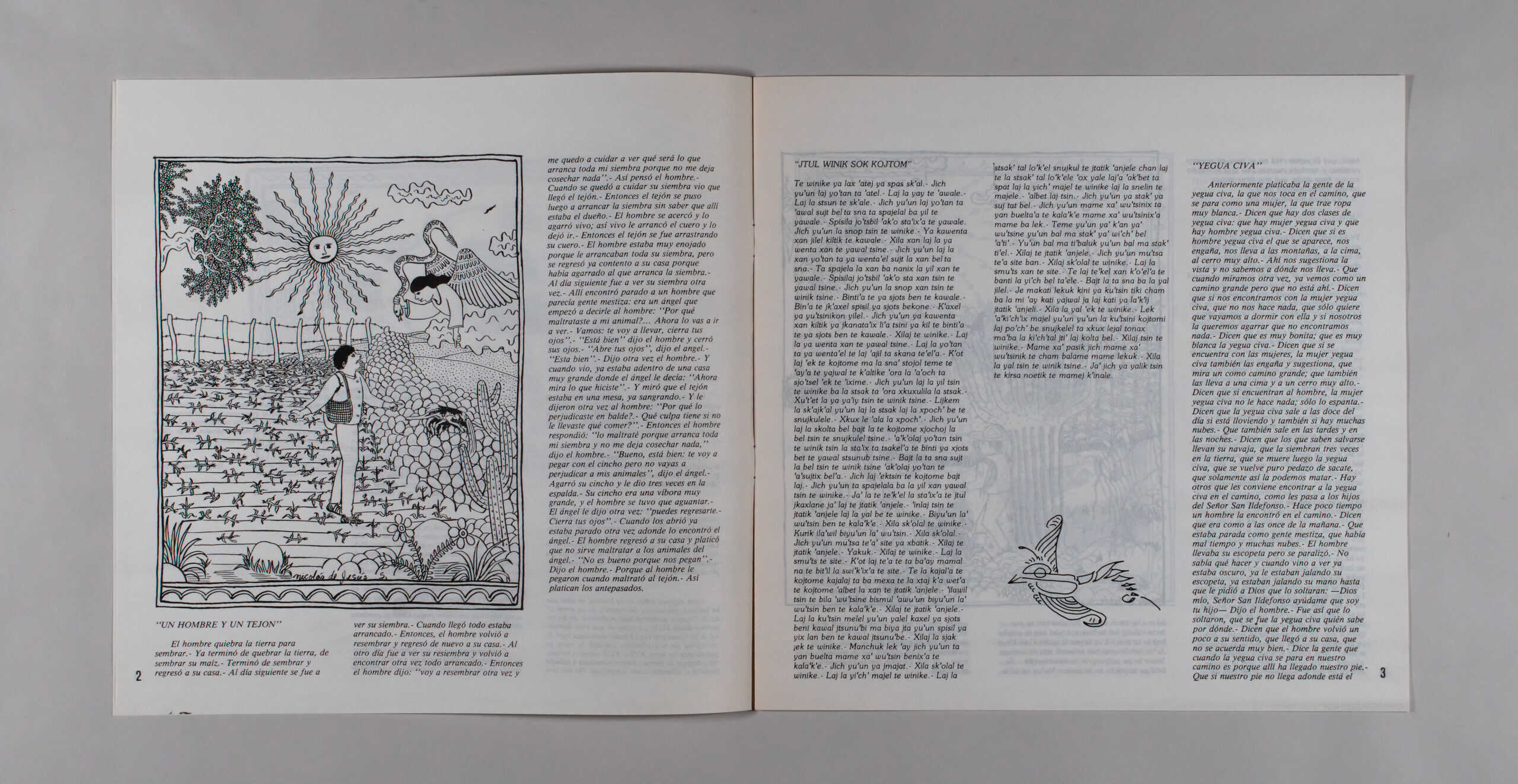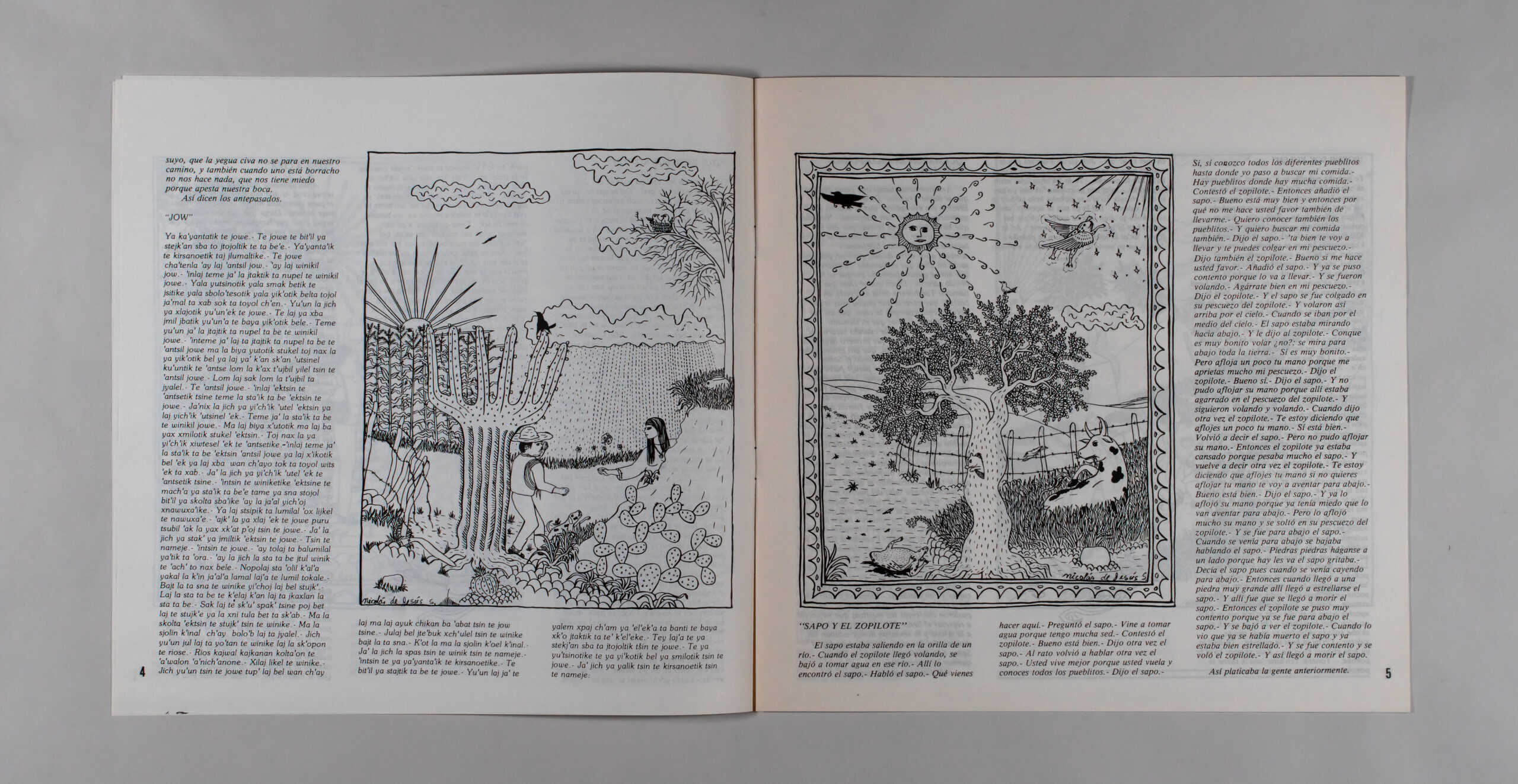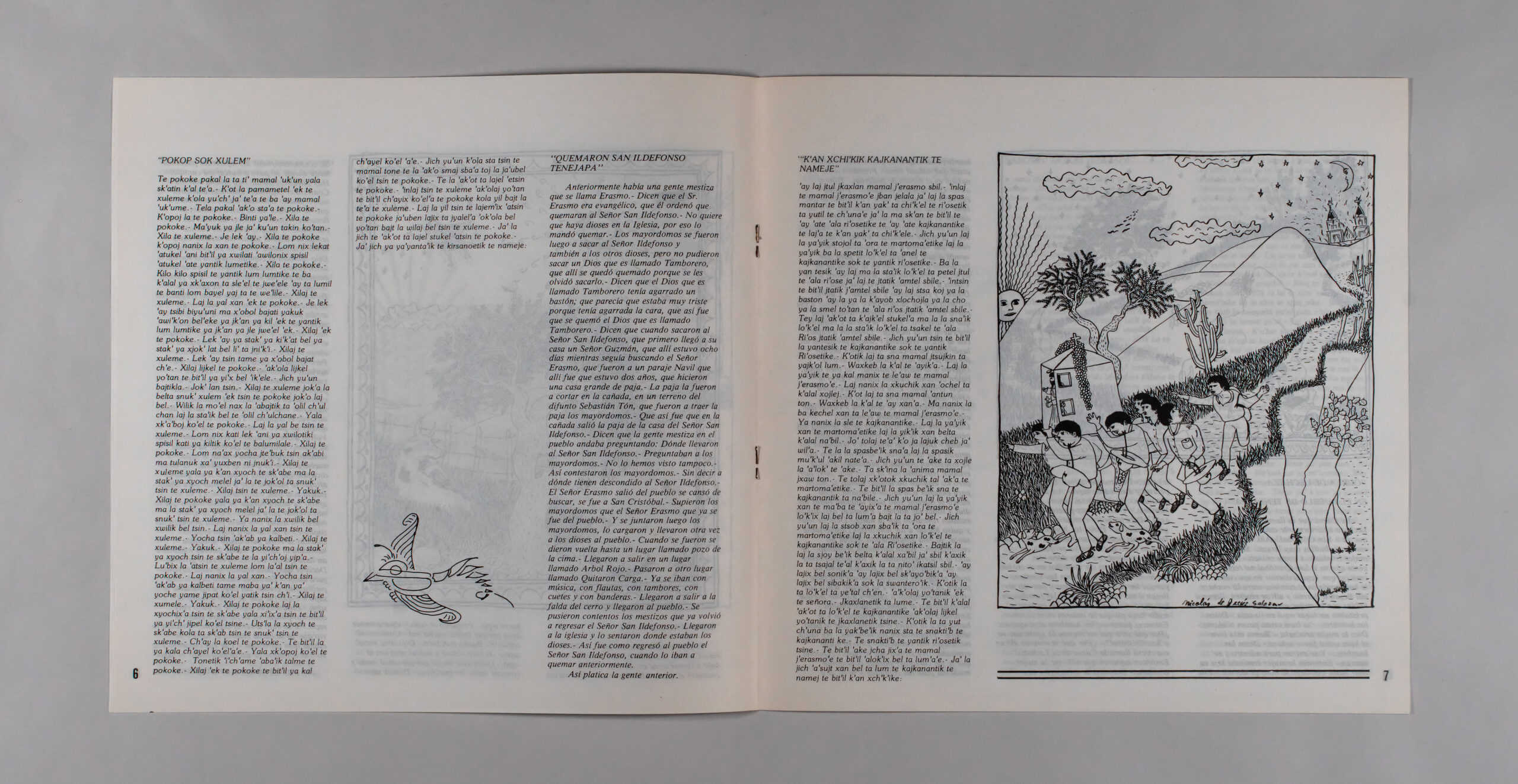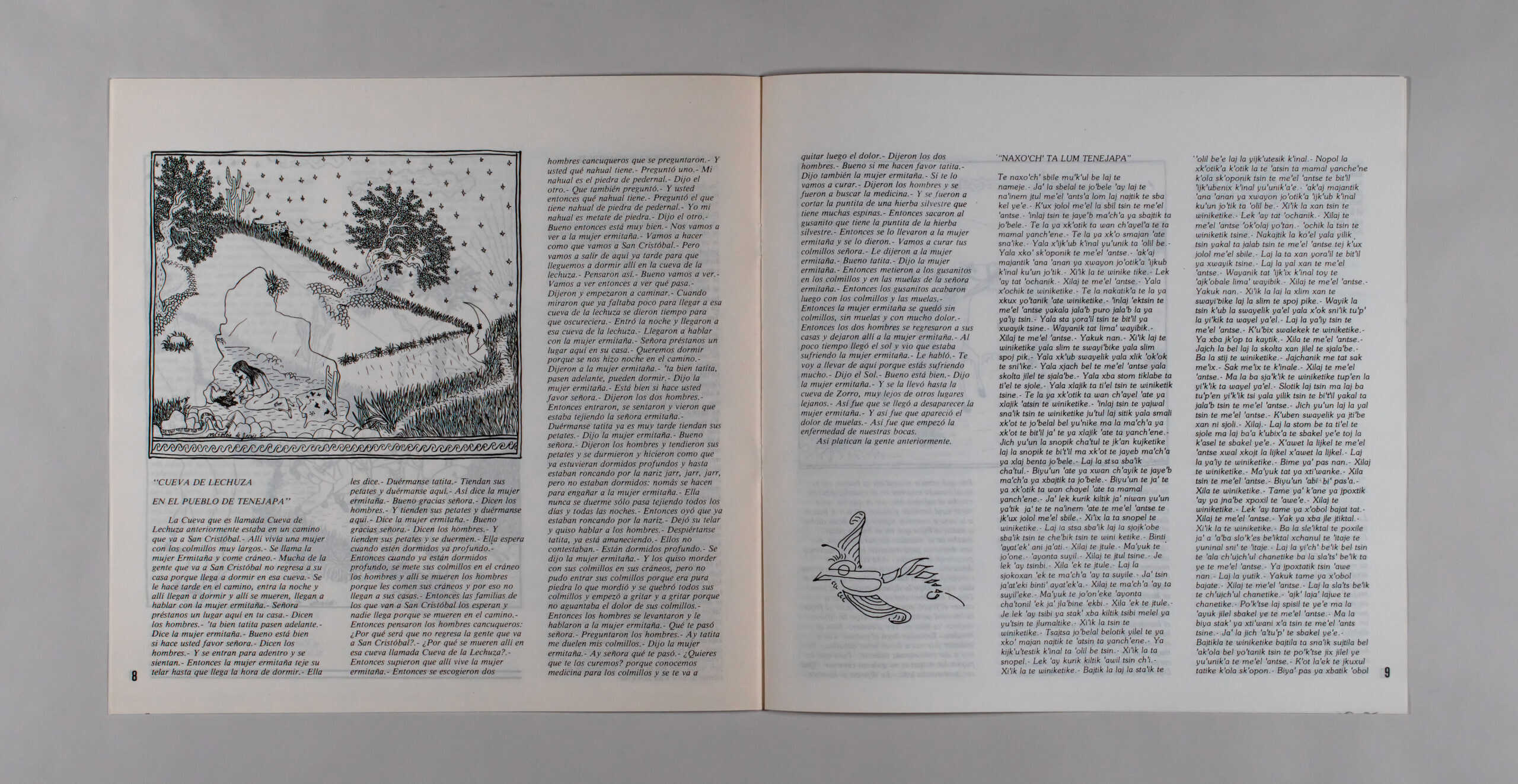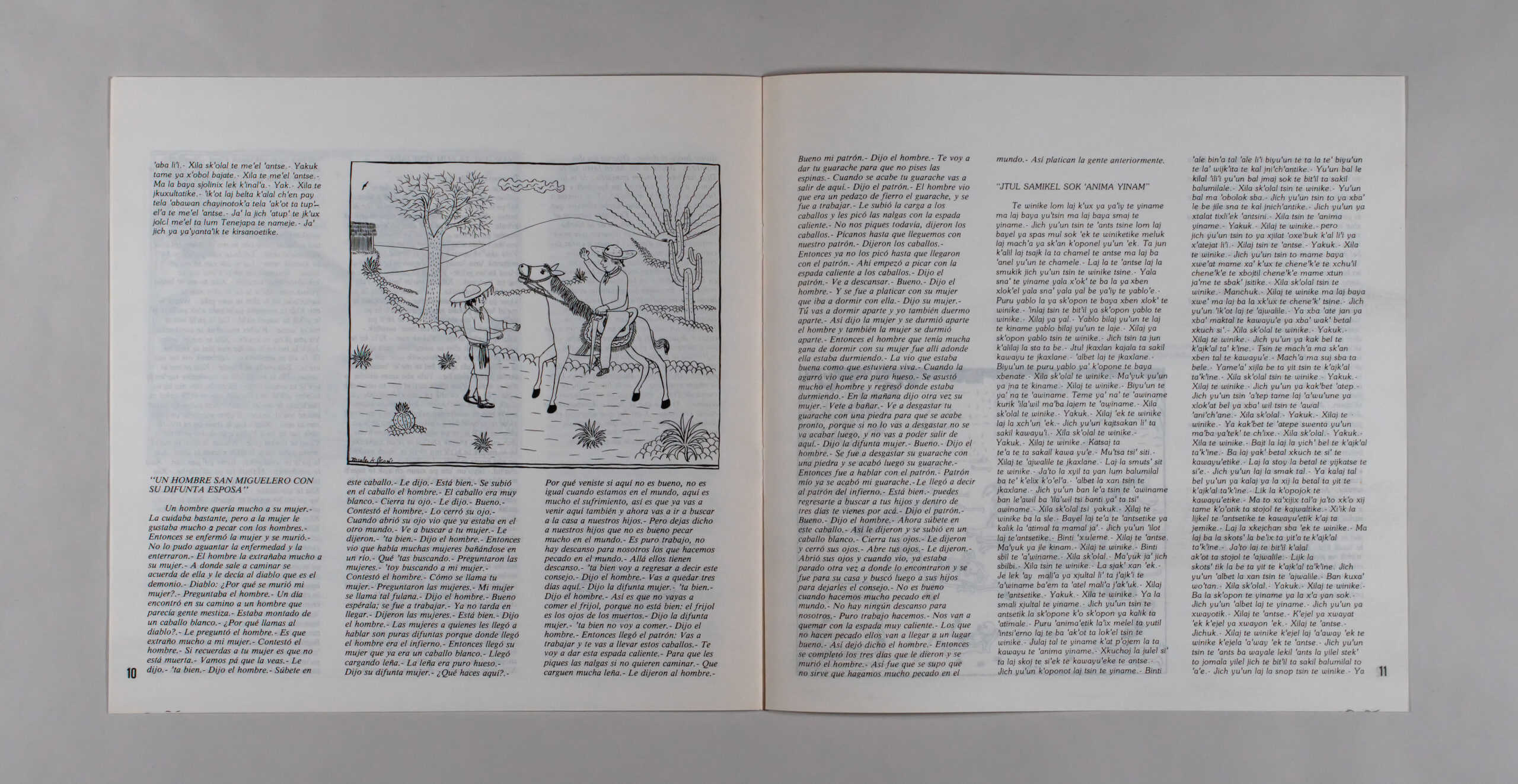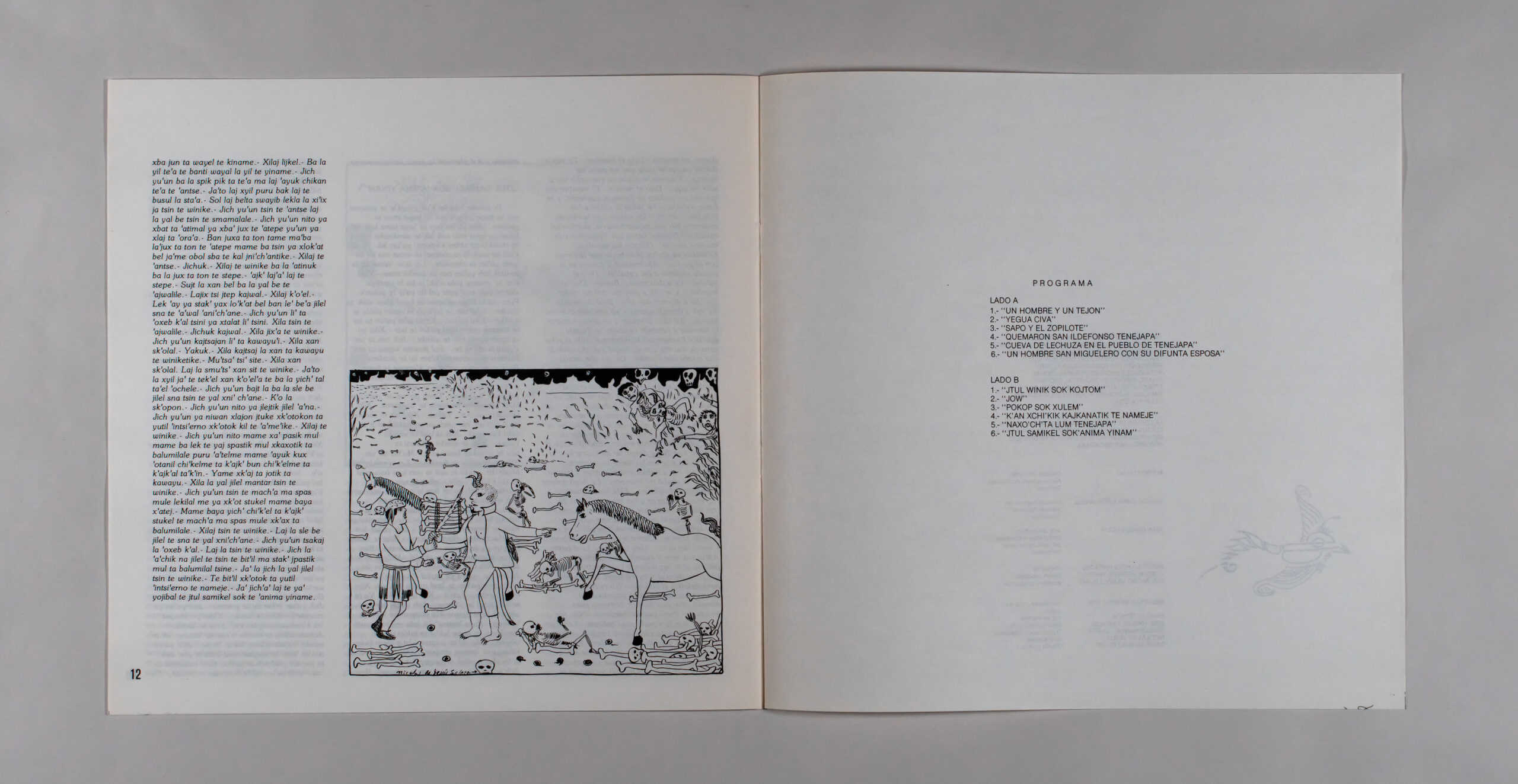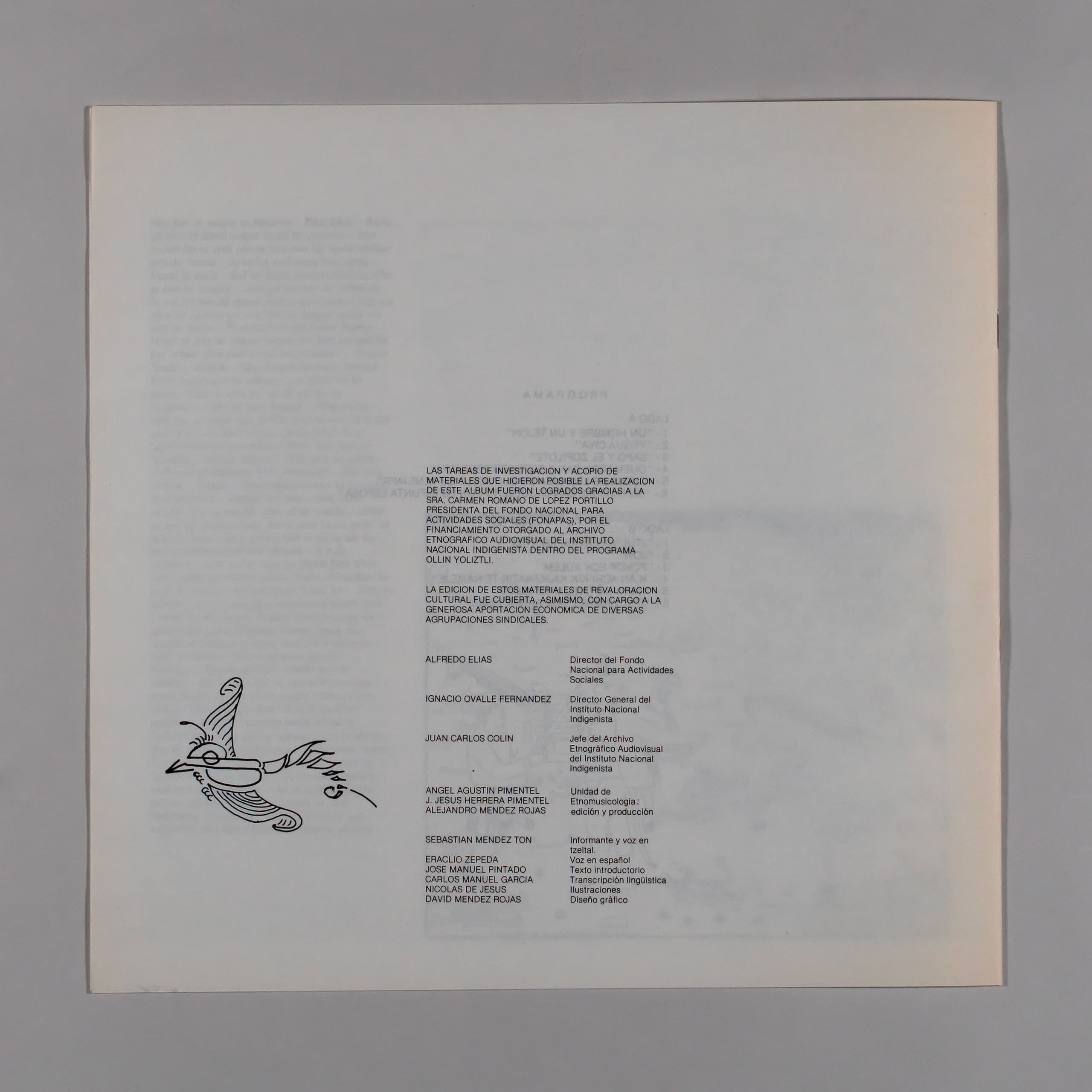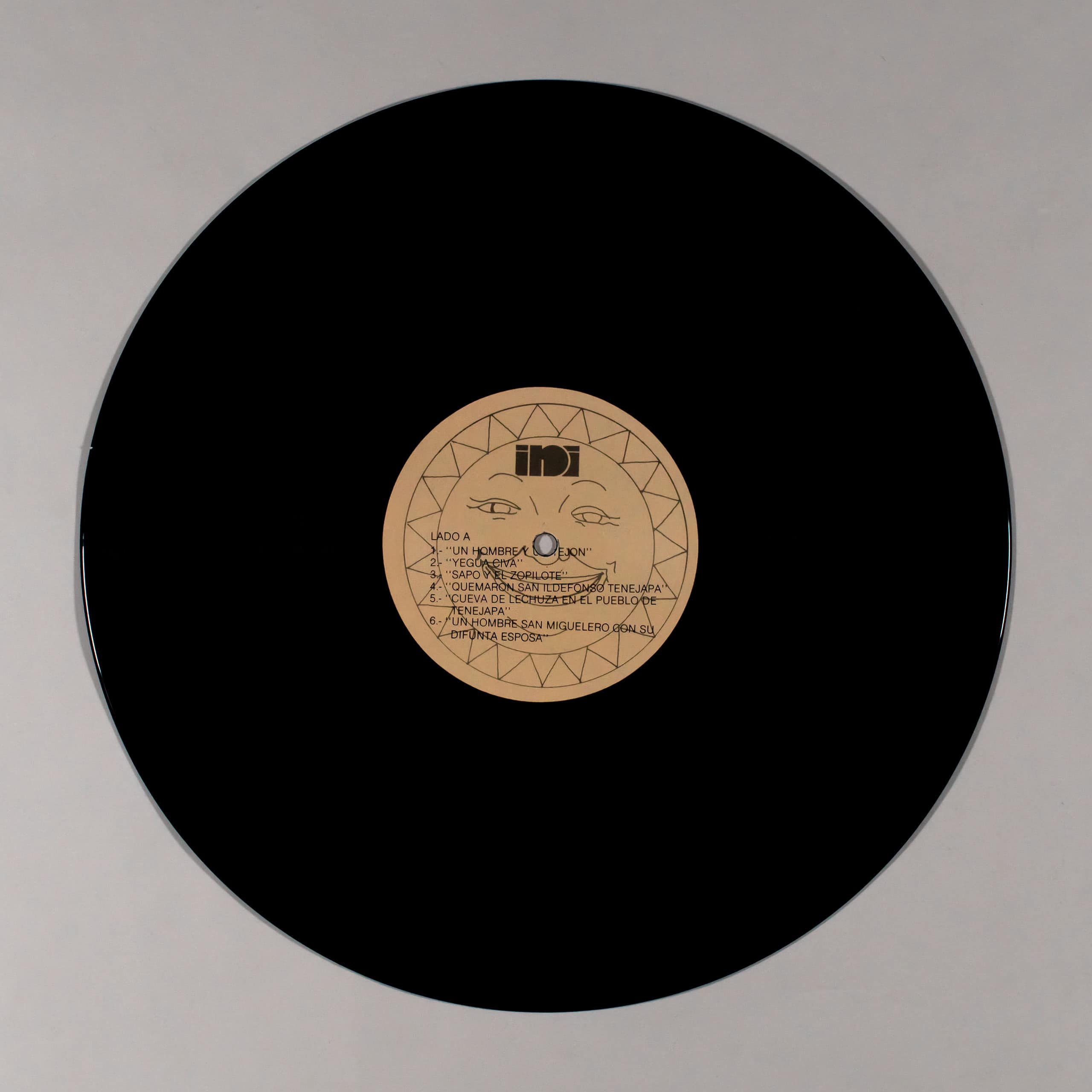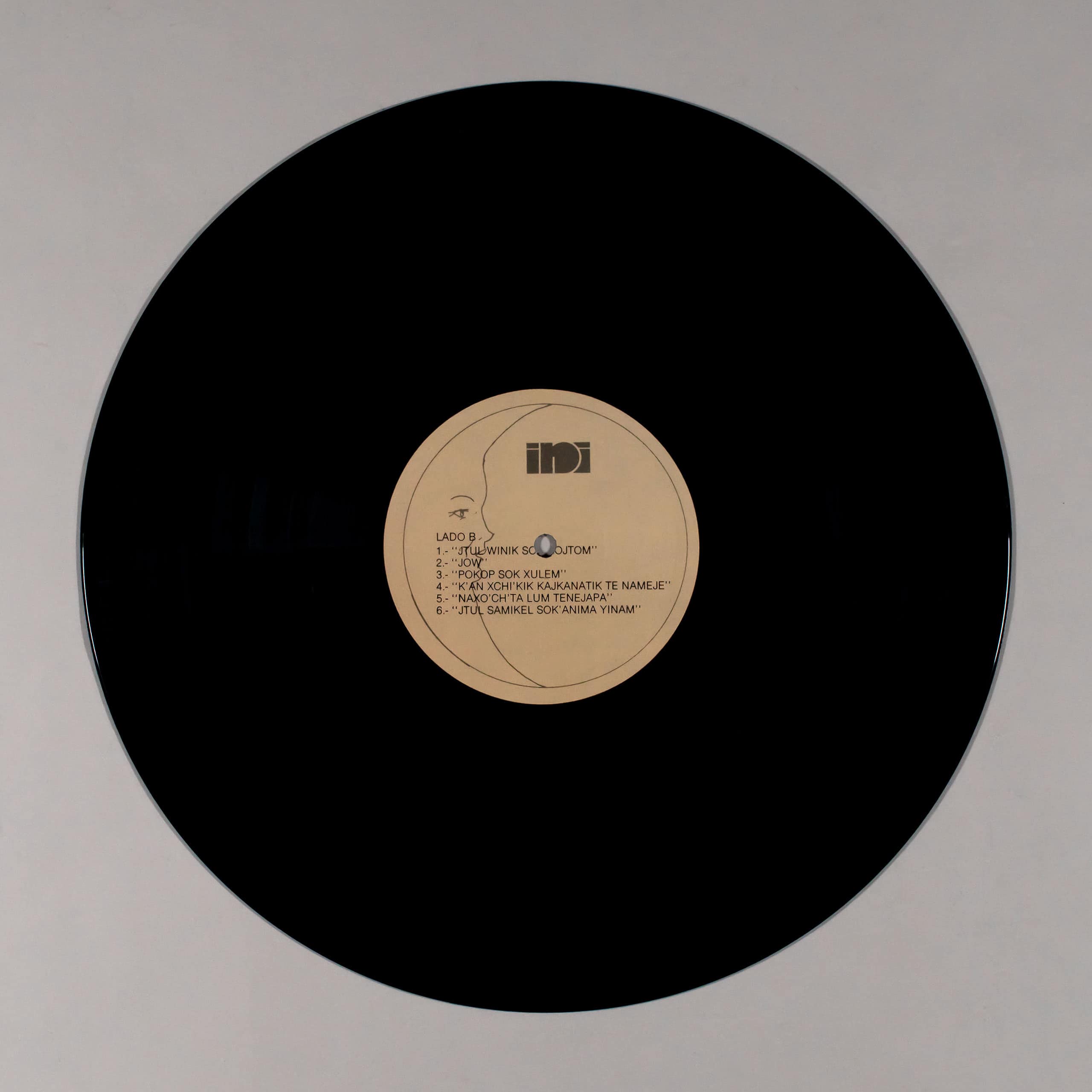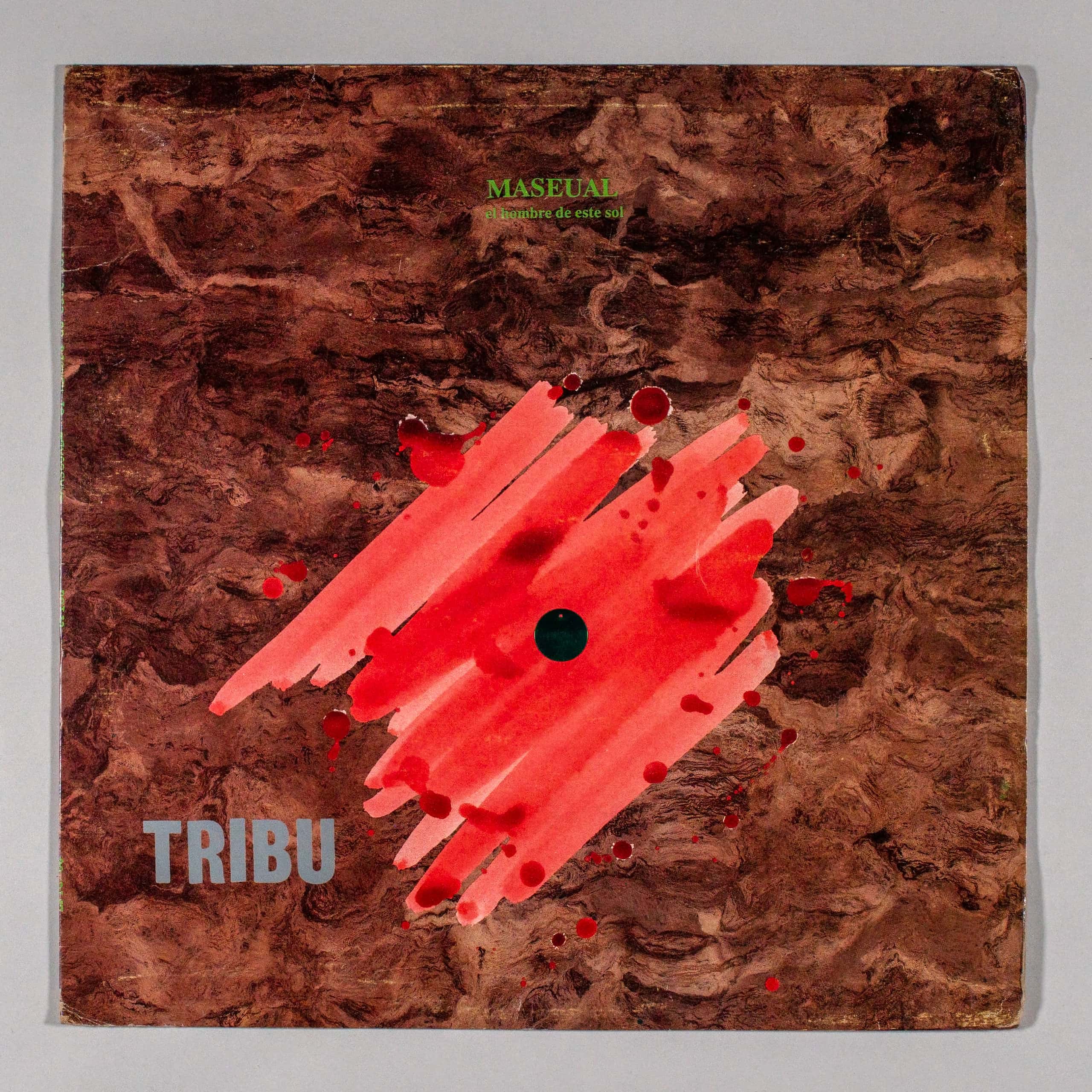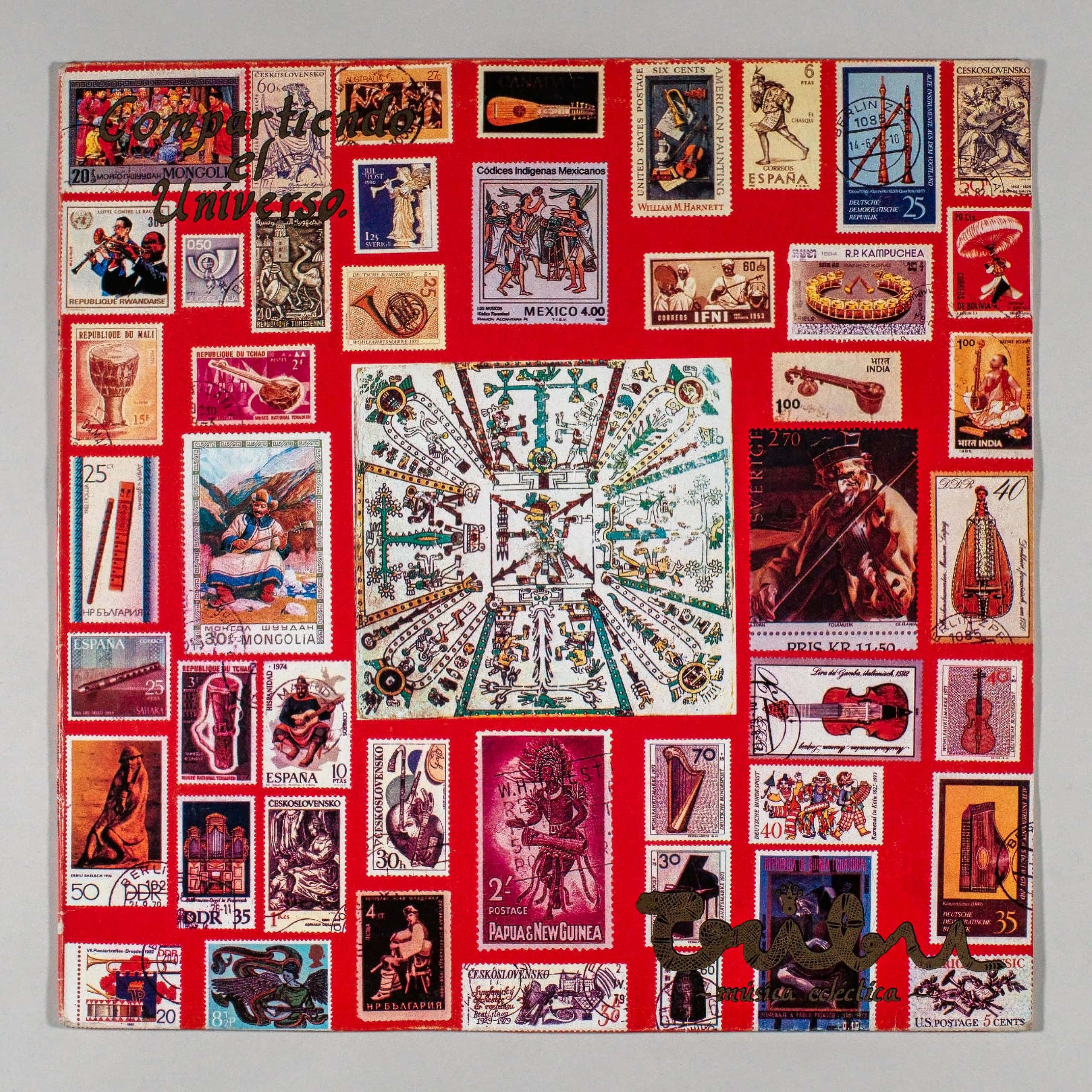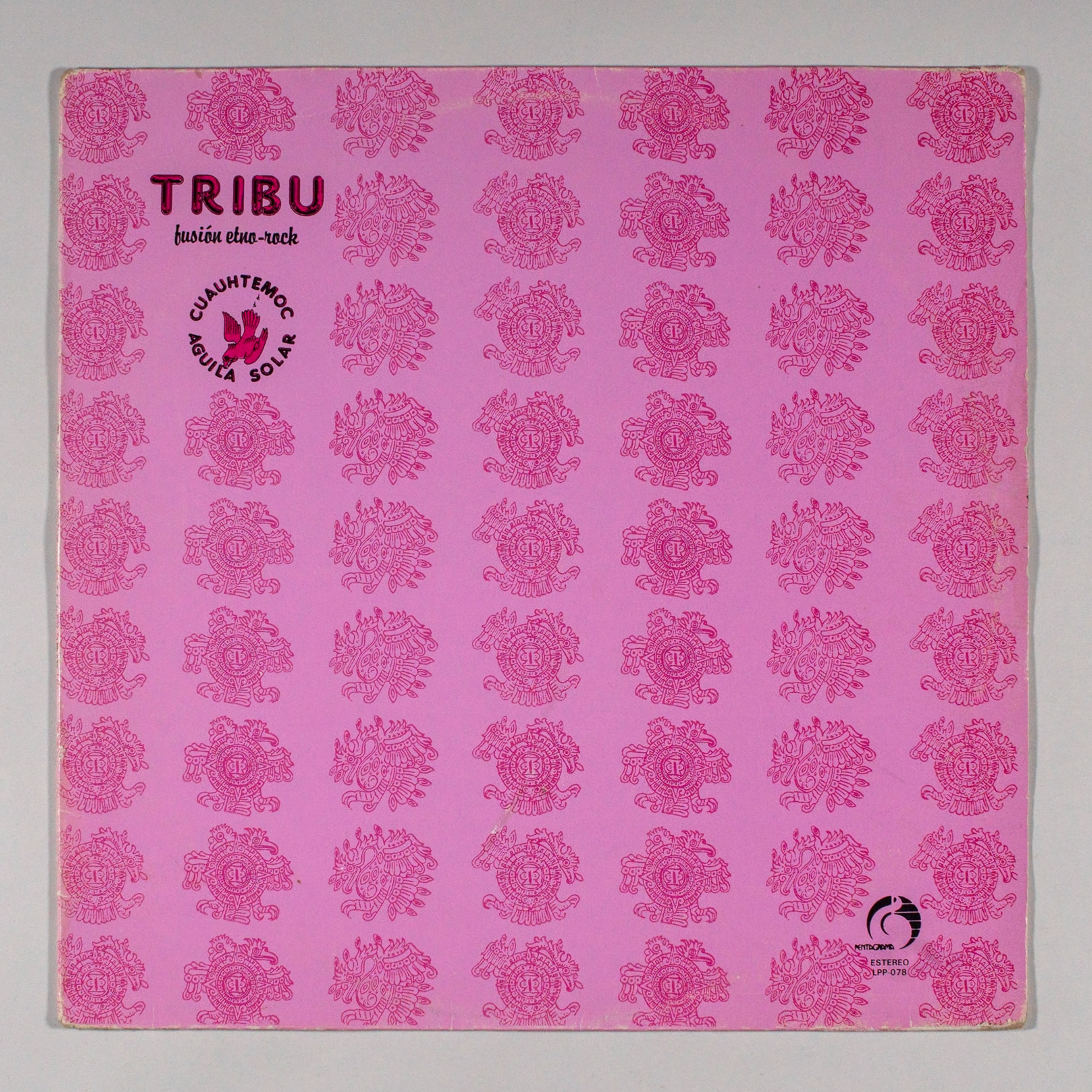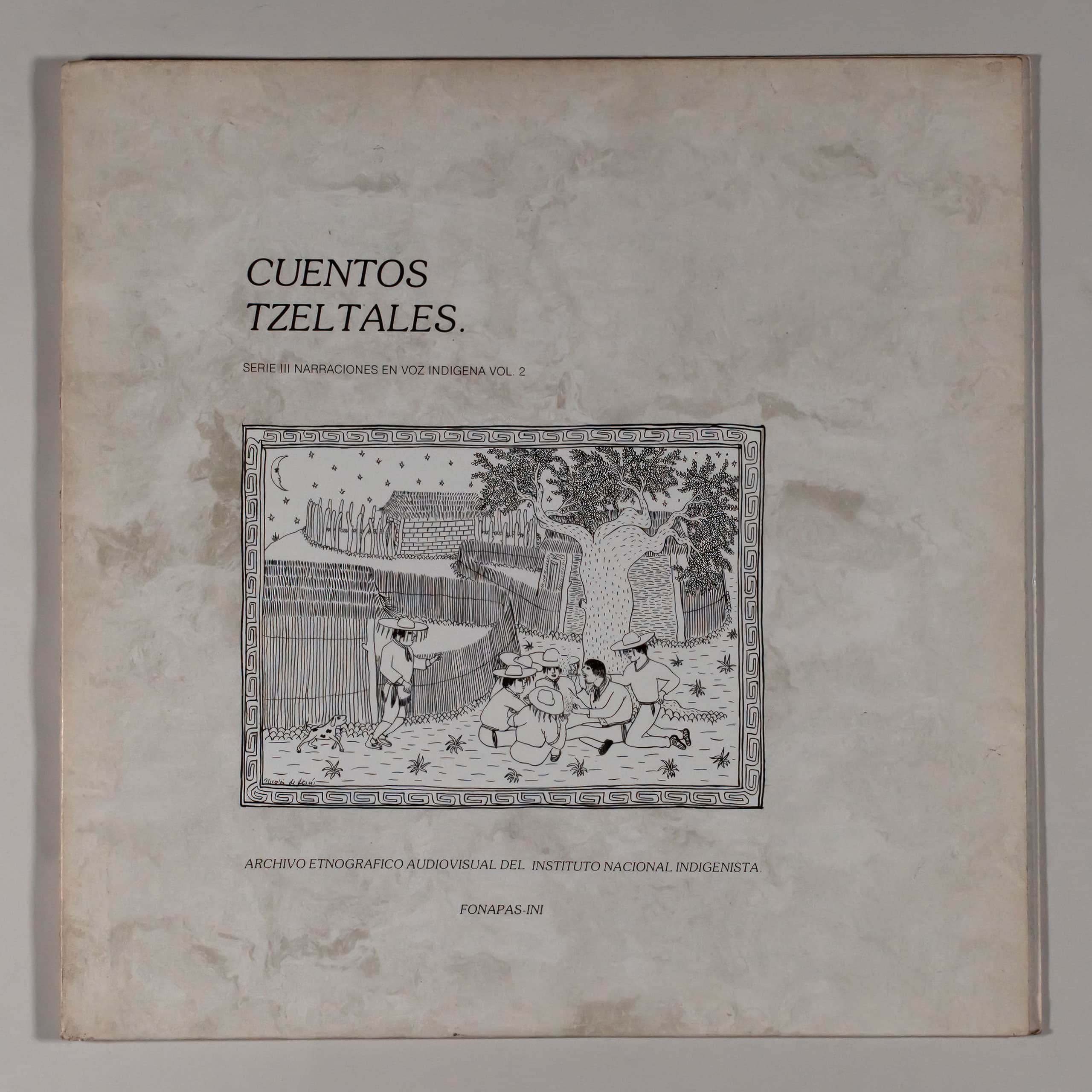
|
Label: FONAPAS-INI SERIES III, VOL. 2 |
Country: Mexico Genre: Folk World & Country |
Info:
TZELTAL TALES.
SERIES III NARRATIONS IN INDIGENOUS VOICE VOL. 2
AUDIOVISUAL ETHNOGRAPHIC ARCHIVE OF THE NATIONAL INDIGENIST INSTITUTE
FONAPAS – INI
TZELTAL TALES
These stories are part of the oral tradition that is still valid in many of the country’s indigenous communities, despite the fact that day by day it is losing space in cultures that suffer the invasion of the mass media of discommunication.
Fortunately there are places where people still gather, to talk under the tallest tree, in the square, in any corner where the word is still alive.
From one of these towns; Specifically from Tenejapa, in the highlands of Chiapas, Sebastián Méndez Tón recently came down with his cargo of stories, some of which are part of this album. The stories that Sebastián has been collecting over the years belong to the oral tradition that contemporary Tzeltals continue to maintain despite centuries of occupation.
Regarding some details of their history, it is known that the Tzeltals, inhabitants of the center and high areas of Chiapas, remained under the rule of the Spanish since 1528, and despite the fact that Fray Bartolomé de las Casas with his 17 Dominican friars tried to protect them of colonial exploitation, the truth is that during the 17th and 18th centuries they suffered slavery and land dispossession and were subjected to forced labor or used as porters. It was not unusual to see during the colonial era caravans of 400 Tzeltals traveling a thousand kilometers of trails, from San Cristóbal to Veracruz, to send natural products to Spain. It is also known that from 1720 to 1850, when royal privileges over the land were suppressed, the community had a certain autonomy that was restricted again when the Ladino invasion began. Since then and until today, a large number of Tzeltals work as day laborers on coffee farms. Their history of exploitation has not ceased, and today colonies of Tzeltales and other Mayan groups found new towns in the Chiapas jungles, once they managed to escape the striped tents of the farms, and the condition of pigeonholed laborers.
Despite everything, the Tzeltal culture has been maintained, as these stories demonstrate. In them we can find both vestiges of the Popol-Vuh and some pre-Hispanic myths; elements of syncretism in which the impact of the Conquest survives, and more than anything else a deeply indigenous sensitivity in its relationship with reality. We can see this original vision of the world in the structure and language of the stories, in which the simplicity of the anecdote actually contains the complexity of a vision that is deeply harmonious with nature.
As expressions of a current oral tradition, stories are anonymous works that have collected the elements that constitute them over long periods of time. The anthropomorphization of objects and animals that we find in them, the parallelism or repetition of phrases and syntactic structures, the apparent arbitrariness of the verbal turns and in general the treatment of the themes is made from a ceremonial function in which language, As in the original myths, it emerges as an instrument of understanding and invention of the world.
Jose Manuel Pintado
“A MAN AND A BADGER”
The man breaks the earth to sow. He already finished breaking up the land, planting his corn.- He finished planting and returned to his house.- The next day he went to see his planting.- When he arrived everything was uprooted. Then, the man replanted and returned to his house. The next day he went to see his replanting and found everything uprooted again. Then the man said: “I’m going to replant again and I’ll stay to take care of it.” Let’s see what will tear up all my crops because it won’t let me harvest anything.” That’s how the man thought. When he stayed to take care of his crops, he saw that the badger arrived. Then the badger immediately began to tear up the crops without knowing that The owner was there.- The man approached and grabbed him alive; so alive he tore off the leather and let it go. Then the badger left dragging his hide. – The man was very angry because they had torn up all his crops, but he returned home happy because he had caught the one who was tearing up his crops. – The next day he went to see his crops again. .- There he found a man standing who looked like mixed race people: it was an angel who began to tell the man: “Why did you mistreat my animal?… Now you are going to go see him.- Come on: I’m going to take you, close your eyes”. “Okay,” the man said and closed his eyes. “Open your eyes,” said the angel.- “It’s okay.”- The man said again.- And when he saw, he was already inside a very large house where the angel told him: “Now look what you did.” . And he saw that the badger was on a table, already bleeding. – And they said again to the man: “Why did you harm him in vain? – What is his fault if you did not bring him food?” – Then the man replied: ” I mistreated him because he uproots all my crops and doesn’t let me harvest anything, said the man. – “Well, okay: I’m going to hit you with the belt, but don’t harm my animals,” said the angel. – He grabbed his belt. and it hit him three times in the back. His belt was a very large snake, and the man had to hold on. The angel told him again: “you can go back. – Close your eyes.” where the angel found him.- The man returned home and said that it is no use mistreating the angel’s animals.- “It is not good because they hit us.” The man said.- Because they hit the man when he mistreated the badger. –
This is how the ancestors talk.
“JTUL WINIK SOK KOJTOM”
Te winike ya lax ‘atej ya spas sk’al.- Jich yu’un laj yo’tan ta ‘atel. Laj la yay te ‘awale.. Laj la stsun te sk’ale.. Jich yu’un laj yo’tan ta ‘awal sujt bel ta sna ta spajelal ba yil te yawale.- Spisila jo’tsbil ‘ak’o sta’x’a te yawale. Jich yu’un la snop tsin te winike.. Ya kawenta xan jilel kiltik te kawale.- Xila xan laj la ya wenta xan te yawal tsine.- Jich yu’un laj la xan yo’tan ta ya wenta’el sujt la xan bel ta sna. Ta spajela la xan ba nanix la yil xan te yawale. Spisilaj jo’tsbil ‘ak’o sta xan tsin te yawal tsine.. Jich yu’un la snop xan tsin te winik tsine.- Binti’a te ya sjots ben te kawale.- Bin’a te jk’axel spisil ya sjots bekone.. K’axel ya yu’tsinikon yilel. Jich yu’un ya kawenta xan kiltik ya jkanata’ix li’a tsini ya kil te binti’a te ya sjots ben te kawale.. Xilaj te winike.. Laj la ya wenta xan te yawal tsine.- Laj la yo’tan ta ya wenta’el te laj ‘ajil ta skana te’el’a. K’ot laj ‘ek te kojtome ma la sna’ stojol teme te ‘ay’a te yajwal te k’altike ‘ora la ‘a’och ta sjo’tsel ‘ek te ‘ixime. Jich yu’un laj la yil tsin te winike ba la stsak ta ‘ora xkuxulila la stsak.- Xu’t’et la ya ya’iy tsin te winik tsine.. Lijkem la sk’ajk’al yu’un laj la stsak laj la xpoch’ be te snujkulele. Xkux le ‘ala la xpoch’.- Jich yu’un laj la skolta bel bajt la te kojtome xjochoj la bel tsin te snujkulel tsine. ‘a’k’olaj yo’tan tsin te winik tsin la sta’ix ta tsakel’a te binti ya xjots bet te yawal stsunub tsine.- Bajt la ta sna sujt la bel tsin te winik tsine ‘ak’olaj yo’tan te ‘a’sujtix bel’a.- Jich laj ‘ektsin te kojtome bajt laj. Jich yu’un ta spajelala ba la yil xan yawal tsin te winike.. Ja’ la te te’k’el la sta’ix’a te jtul jkaxlane ja’ laj te jtatik ‘anjele.. ‘inlaj tsin te jtatik ‘anjele laj la yal be te winike.. Biyu’un la’ wu’tsin ben te kala’k’e.- Xila sk’olal te winike.. Kurik ila’wil biyu’un la’ wu’tsin.- Xila sk’olal.. Jich yu’un mu’tsa te’a’ site ya xbatik.- Xilaj te jtatik ‘anjele.. Yakuk. Xilaj te winike.. Laj la smu’ts te site.. K’ot laj te’a te ta ba’ay mamal na te bit’ll la swi’k’ix’a te site.- Te la kajal’a te kojtome kajalaj ta ba mexa te la xtaj k’a wet’a te kojtome ‘albet la xan te jtatik ‘anjele.. ‘ilawil tsin te bila ‘wu’tsine bismul ‘awu’un biyu’un la’ wu’tsin ben te kala’k’e. Xilaj te jtatik ‘anjele.. Laj la ku’tsin melel yu’un yalel kaxel ya sjots beni kawal jtsunu’bi ma biya jta yu’un spisil ya yix lan ben te kawal jtsunu’be.. Xilaj la sjak jek te winike. Manchuk lek ‘ay jich yu’un ta yan buelta mame xa’ wu’tsin benix’a te kala’k’e. Jich yu’un ya jmajat.- Xila sk’olal te winike.. Laj la yi’ch’ majel te winike.- Laj la stsak’ tal lo’k’el snujkul te jtatik ‘anjele chan laj te la stsak’ tal lo’k’ele ‘ox yale laj’a ‘ak’bet ta spat laj la yich’ majel te winike laj la snelin te majele. ‘albet laj tsin. Jich yu’un ya stak’ ya suj tat bel.- Jich yu’un mame xa’ wu’tsinix ta yan buelta’a te kala’k’e mame xa’ wu’tsinix’a mame ba lek. Teme yu’un ya’ k’an ya’ wu’tsine yu’un bal ma stak’ ya’ wi’ch’ bel ‘a’ti’. Yu’un bal ma ti’baluk yu’un bal ma stak’ ti’el. Xilaj te jtatik ‘anjele.. Jich yu’un mu’tsa te’a site ban. Xilaj sk’olal te winike.. Laj la smu’ts xan te site. Te laj te’kel xan k’o’el’a te banti la yi’ch bel ta’ele.. Bajt la ta sna ba la yal jilel. Je makati lekuk kini ya ku’tsin tiki cham ba la mi ‘ay kati yajwal ja laj kati ya la’k’ij jtatik ‘anjeli.- Xila la yal ‘ek te winike.. Lek ‘a’ki’ch’ix majel yu’un yu’un la ku’tsini kojtomi laj po’ch’ be snujkelel ta xkux lejal tonax ma’ba la ki’ch’tal jti’ laj kolta bel.. Xilaj tsin te winike. Mame xa’ pasik jich mame xa’ wu’tsinik te cham balame mame lekuk.- Xila la yal tsin te winik tsine.- Ja’ jich ya yalik tsin te kirsa noetik te mamej k’inale.
“CIVA MARE”
Previously, people were talking about the civa mare, the one we see on the road, who stands like a woman, the one who wears very white clothes. – They say that there are two kinds of civa mare: that there is a female civa mare and that there is a man. Civa mare.- They say that if it is a man, a civa mare, the one who appears, deceives us, takes us to the mountains, to the top, to the very high hill.- There the sight suggests us and we do not know where it takes us.- That When we look again, we see a big road but it’s not there. They say that if we meet the wild mare woman, she doesn’t do anything to us, she just wants us to go sleep with her and if we want to grab her that we didn’t find anything. They say she is very pretty; that the civa mare is very white.- They say that if she meets women, the civa mare woman also deceives and suggests them, that she looks at a big road; which also takes them to a peak and a very high hill. – They say that if they find the man, the female horse does nothing to him; she only scares him away.- They say that the civa mare comes out at twelve o’clock if it is raining and also if there are a lot of clouds.- That she also comes out in the afternoons and at night. They say that those who know how to save themselves carry their razor, that they sow it three times in the ground, that the wild mare dies afterwards, that it becomes a pure piece of grass, that only in this way can we kill it. – There are others that it is better for them to find the mare lives on the road, as happens to the children of Lord San Ildefonso.- A short time ago a man found her on the road.- They say it was around eleven in the morning.- That she was standing like mestizo people, that there was bad weather and a lot of clouds.- The man was carrying his shotgun but he became paralyzed.- He didn’t know what to do and when he came to see it was already dark, they were already pulling his shotgun, they were already pulling his hand until he asked God to let him go: “My God, Lord San Ildefonso, help me, I am your son,” the man said. That’s how they let him go, and the wild mare went who knows where. They say the man came to his senses a little, that he arrived home, and he doesn’t remember very well. People say that when the mare If our foot does not reach where hers is, the civa mare does not stop in our path, and also when one is drunk she does nothing to us, she stops us. He is afraid because our mouth stinks.
This is what the ancestors say.
“JOW”
Ya ka yantatik te jowe.- Te jowe te bit’il yo sheik’an sba to jojoltik te to be’e.- Ya’yantalk Te jowe cha benla ay laj antsil jow.- ‘ay laj winikil jowe.- ‘inlaj teme ja’ la jtaktik to nupel te winikil jowe.- Yala yutsinotik yala smak betik te jske yala sbolo besotik yala yik’otik beita tojol jamal ta xab sok ta toyol ch’en.- Yu’un la jich ya xlajotik yu’un’ek te jowe.- Te laj ya xba jmil jbatik yu’un’a te baya yik’otik bele.- Teme yu’un ja’ la jtajtik ta nupel ta be te winikil jowe.- ‘inteme ja’ laj ta jtajtik ta nupel ta be te ‘antsil jowe ma la biya yutotik stukel toj nax la ya yik’otik bel ya laj ya’ k’an sk’an ‘utsinel ku’untik te ‘antse lom la k’ax t’ujbil yilel tsin te antsil jowe.- Lom laj sak lom la t’ujbil ta jyalel.- Te ‘antsil jowe.- ‘inlaj ‘ektsin te “antsetik tsine teme la sta’ik ta be ‘ektsin te jowe.- Ja’nix la jich ya yi’ch’ik ‘utel ‘ektsin ya laj yichik ‘utsinel ‘ek.- Teme ja’ la sta’ik ta be te winikil jowe.- Ma laj biya x’utotik ma laj ba yax xmilotik stukel ‘ektsin.- Toj nax la ya yi’chik xiwtesel ‘ek te ‘antsetike.- ‘inlaj teme ja’ la sta’ik ta be ‘ektsin ‘antsil jowe ya laj x’ikotik bel ‘ek ya laj xba wan ch’ayo tok ta toyol wits ‘ek ta xab.- Ja’ la jich ya yi’ch’ik ‘utel ‘ek te ‘antsetik tsine.- ‘intsin te winiketike ‘ektsine te mach’a ya sta’ik ta be’e tame ya sna stojol bit’il ya skolta sba’ike ‘ay la ja’al yich’oj xnawuxa’ike.- Ya laj stsipik ta lumilal ‘ox lijkel te nawuxa’e.- ‘ajk’ la ya xlaj ‘ek te jowe puru tsubil ‘ak la yax xk’at p’oj tsin te jowe.- Ja’ la jich ya stak’ ya jmiltik ‘ektsin te jowe.- Tsin te nameje.- ‘intsin te jowe.- ‘ay tolaj ta balumilal ya’tik ta ‘ora.- ‘ay la jich la sta ta be jtul winik te ‘sch’ to nax bele.- Nopolaj sta ‘alil k’al’a yakal la k’in ja’al’a lamal laj’a te lumil tokale.- Bajt la to sna te winike vi’choj laj bel stujk’.- Laj la sta to be te k’elaj k’an laj ta jkaxlan la sto to be.- Sak laj té sk’u’ spak’ tsine poj bet laj te stujk’e ya la xni tula bet ta sk’ab.- Ma la skolta ‘ekisin te stujk’ tsin te winike. Ma la sjolin kinal ch’ay bolo’b laj to jyalel.- Jich yu’un jul laj ta yo’tan te winike laj la sk’opon te rose.- Rios kajwal kajkanan kolta’on te ‘a’walon ‘a’nich’anone.- Xilaj likel te winike.- Jich yu’un tsin te jowe tup’ laj bel wan ch’ay laj ma laj ayuk chikan ba ‘abat tsin te jow tsine.- Julaj bel jte ‘buk xch’ulel tsin te winike bajt la ta sna.- K’ot la ma la sjolin k’oel k’inal.- Ja’ la jich la spas tsin te winik tsin te nameje.- ‘intsin te ya ya’yanta’ik te kirsanoetike.- Te bit’il ya stajtik ta be te jowe.- Yu’un laj ja’ te yalem xpaj ch’am ya ‘el’ek’a ta banti te baya xk’o jtaktik ta te’ k’el’eke.- Tey laj’a te ya stekj’an sba ta jtojoltik tśin te jowe.- Te ya yu’tsinotike te ya yi’kotik bel ya smilotik tsin te jowe.- Te ya yu’tsinotike te ya yi’kotik bel ya smilotik tsin te jowe.- Ja’ jich ya yalik tsin te kirsanoetik tsin te nameje:
“TOAD AND THE VULCH”
The toad was hanging out on the bank of a river.- When the buzzard came flying, he got down to drink water in that river.- The toad found him there.- The toad spoke.- What are you doing here?- The toad asked. – I came to drink water because I’m very thirsty. – The buzzard answered. – Well, that’s fine. – The toad said again. – After a while the toad spoke again. – You live better because you fly and you know all the little towns. – Said the toad. – Yes, I do know all the different little towns where I go to look for my food. – There are little towns where there is a lot of food. – The buzzard answered. – Then the toad added. – Well, that’s very good and then Why don’t you also do me a favor and take me.- I also want to see the little towns.- And I want to look for my food too.- Said the toad.- ‘Okay, I’m going to take you and you can hang yourself on my neck.- He also said. the buzzard.- Well if you do me a favor. The toad added.- And he was already happy because he was going to take it.- And they flew away.- Hold on tight to my neck.- The buzzard said.- And the toad went off hanging on the buzzard’s neck.- And they flew away. like that up in the sky.- When they were going through the middle of the sky.- The toad was looking down.- And he said to the buzzard.- So it’s very nice to fly, isn’t it?: you look down at the whole earth.- Yes, it is very pretty.- But loosen your hand a little because you are squeezing my neck a lot.- Said the vulture.- Well yes.- Said the toad.- And he couldn’t loosen his hand because there he was clinging to the vulture’s neck. – And they continued flying and flying.- When the buzzard said again.- I’m telling you to loosen your hand a little.- Yes, that’s okay.- The toad said again.- But he couldn’t loosen his hand.- Then the buzzard I was already tired because the toad was too heavy.- And the buzzard says again.- I’m telling you to loosen your hand. If you don’t want to loosen your hand, I’m going to throw you down.- Well, that’s fine.- Said the toad. – And he loosened his hand because he was already afraid that they were going to throw him down. – But his hand loosened him a lot and he let go of the buzzard’s neck. – And the toad went down. – When he was coming down, he The toad came down talking.- Stones, stones, move aside because there is something wrong with you, the toad shouted.- The toad said when he was falling down.- Then when he reached a very big stone, the toad crashed there.- And That’s when the toad died. – Then the vulture was very happy because the toad had already gone down. – And the vulture looked up to see. – When he saw that the toad had already died and he was already well crashed.- And he left happily and the vulture flew away.- And that’s how the toad came to die.
This is how people talked before.
“POKOP SOK XULEM”
Te pokoke pakal la ta ti’ mamal ‘uk’un yala sk’atin k’al te’a.- K’ot la pamametel ‘ek te xuleme k’ola yu’ch’ ja’ te’a te ba ‘ay mamal ‘uk’ume.- Tela pakal ‘ak’o sta’a te pokoke.- K’opoj la te pokoke.- Binti ya’le.- Xila te pokoke.- Ma’yuk ya jle ja’ ku’un takin ko’tan.- Xila te xuleme.- Je lek ‘ay.- Xila te pokoke k’opoj nanix la xan te pokoke.- Lom nix lekat ‘atukel ‘ani bit’il ya xwilati ‘awilonix spisil ‘atukel ‘ate yantik lumetike.- Xila te pokoke.- Kilo kilo spisil te yantik lum lumtike te ba k’alal ya xk’axon ta sle’el te jwe’ele ‘ay ta lumil te banti lom bayel yaj ta te we’lile.- Xilaj te xuleme.- Laj la yal xan ‘ek te pokoke.- Je lek ‘ay tsibi biyu’uni ma x’obol bajati yakuk ‘awi’k’on bel’eke ya jk’an ya kil ‘ek te yantik lum lumtike ya jk’an ya jle jwe’el ‘ek.- Xilaj ‘ek te pokoke.- Lek ‘ay ya stak’ ya ki’k’at bel ya stak’ ya xjok’ lat bel li’ ta jni’k’i.- Xilaj te xuleme.- Lek ‘ay tsin tame ya x’obol bajat ch’e.- Xilaj lijkel te pokoke.- ‘ak’ola lijkel yo’tan te bit’il ya yi’x bel ‘ik’ele.- Jich yu’un bajtikla.- Jok’ lan tsin.- Xilaj te xuleme jok’a la belta snuk’ xulem ‘ek tsin te pokoke jok’o laj bel.- Wilik la mo’el nax la ‘abajtik ta ‘olil ch’ul chan laj la sta’ik bel te ‘olil ch’ulchane.- Yala xk’a’boj ko’el te pokoke.- Laj la yal be tsin te xuleme.- Lom nix kati lek ‘ani ya xwilotiki spisil kati ya kiltik ko’el te balumilale.- Xilaj te pokoke.- Lom na’ax yocha jte ‘buk tsin ak’abi ma tulanuk xa’ yuxben ni jnuk’i.- Xilaj te xuleme yala ya k’an xyoch te sk’abe ma la stak’ ya xyoch melel ja’ la te jok’ol ta snuk’ tsin te xuleme.- Xilaj tsin te xuleme.- Yakuk.- Xilaj te pokoke yala ya k’an xyoch te sk’abe ma la stak’ ya xyoch melel ja’ la te jok’ol ta snuk’ tsin te xuleme.- Ya nanix la xwilik bel xwilik bel tsin.- Laj nanix la yal xan tsin te xuleme. Yocha tsin ‘ak’ab ya kalbeti.- Xilaj te xuleme.- Yakuk.- Xilaj te pokoke ma la stak’ ya xyoch tsin te sk’abe te la yi’ch’oj yip’a.- Lu’bix la ‘atsin te xuleme lom la’al tsin te pokoke.- Laj nanix la yal xan.- Yocha tsin ‘ak’ab ya kalbeti tame maba ya’ k’an ya’ yoche yame jipat ko’el yatik tsin ch’i.- Xilaj te xumele.- Yakuk.- Xilaj te pokoke laj la xyochix’a tsin te sk’abe yala xi’ix’a tsin te bit’il ya yi’ch’ jipel ko’el tsine.- Uts ‘la la xyoch te sk’abe kola ta sk’ab tsin te snuk’ tsin te xuleme.- Ch’ay la koel te pokoke.- Te bit’il la ya kala ch’ayel ko’el’a’e.- Yala xk’opoj ko’el te pokoke.- Tonetik ‘I’ch’ame ‘aba’ik talme te pokoke.- Xilaj ‘ek te pokoke te bit’il ya kal ch’ayel ko’el ‘a’e.- Jich yu’un k’ola sta tsin te mamal tone te la ‘ak’o smaj sba’a toj la ja’ubel ko’el tsin te pokoke.- Te la ‘ak’ot ta lajel ‘etsin te pokoke.- ‘inlaj tsin te xuleme ‘ak’olaj yo’tan te bit’il ch’ayix ko’el’a te pokoke kola yil bajt la te’a te xuleme.- Laj la yil tsin te lajem’ix ‘atsin te pokoke ja’uben lajix ta jyalel’a ‘ok’ola bel yo’tan bajt la wilaj bel tsin te xuleme.- Ja’ la jich te ‘ak’ot ta lajel stukel ‘atsin te pokoke.- Ja’ jich ya ya’yanta’ik te kirsanoetik te nameje:
“SAN ILDEFONSO TENEJAPA BURNED”
Previously there was a mestizo people called Erasmus.- They say that Mr. Erasmus was an evangelical, that he ordered Lord San Ildefonso to be burned.- He does not want there to be gods in the Church, that is why he ordered him to be burned.- The mayordomos They then went to take out Lord Ildefonso and also the other gods, but they could not take out a God who is called Tamborero, who was burned there because they forgot to take him out. – They say that the God who is called Tamborero had a staff in his hand; It seemed that he was very sad because he was holding his face, which is how the God who is called the Drummer was burned. They say that when they took Mr. San Ildefonso out, a Mr. Guzmán arrived at his house first, and he stayed there for eight days. While Mr. Erasmus continued searching, they went to a place called Navil, where he stayed for two years, and they made a large house of straw. They went to cut the straw in the ravine, on land owned by the deceased Sebastián Tón, which they the butlers brought the straw.- That’s how the straw came out of the house of Mr. San Ildefonso in the ravine.- They say that the mestizo people in the town were asking: Where did they take Mr. San Ildefonso.- They asked the butlers. .- We have not seen him either.- This is how the butlers answered.- Without saying where they have Mr. Ildefonso unknown.- Mr. Erasmo left the town, he got tired of searching, he went to San Cristóbal.- The butlers knew that the Lord Erasmus had already left the town.- And then the stewards gathered together, carried him and took the gods back to the town.- When they left they turned to a place called the well at the top.- They came out in a place called Red Tree.- They went to another place called Cargo Removed. They were already leaving with music, with flutes, with drums, with songs and with flags.- They came to the foot of the hill and arrived at the town.- The mestizos were happy that Mr. San Ildefonso had already returned.- They arrived to the church and they sat him where the gods were.- This is how Mr. San Ildefonso returned to the town, when they were going to burn him previously.
This is how previous people talk.
“K’AN XCHI’KIK KAJKANANTIK TE NAMEJE”
‘ay laj jtul jkaxlan mamal j’erasmo sbil.- ‘inlaj te mamal j’erasmo’e jban jelala ja’ laj la spas mantar te bit’il k’an yak’ ta chi’k’el te ri’osetik ta yutil te ch’una’e ja’ la ma sk’an te bit’il te ‘ay ‘ate ‘ala ri’osetike te ‘ay ‘ate kajkanantike te laj’a te k’an yak’ ta chi’k’ele.- Jich yu’un laj la ya’yik stojol ta ‘ora te martoma’etike laj la ya’yik ba la spetit lo’k’el ta ‘anel te kajkanantike sok te yantik ri’osetike.- Ba la yan tesik ‘ay laj ma la sta’ik lo’k’el ta petel jtul te ‘ala ri’ose ja’ laj te jtatik ‘amtel sbile.- ‘intsin te bit’il jtatik j’amtel sbile ‘ay laj stsa koj ya la baston ‘ay la ya la k’ayob xlochojla ya la cho ya la smel to’tan te ‘ala ri’os jtatik ‘amtel sbile.- Tey laj ‘ak’ot ta k’ajk’el stukel’a ma la la sna’ik lo’k’el ma la la sta’ik lo’k’el ta tsakel te ‘ala Ri’os jtatik ‘amtel sbile.- Jich yu’un tsin te bit’il la yantesik te kajkanantike sok te yantik Ri’osetike.- K’otik laj ta sna mamal jtsujkin ta yajk’ol lum.- Waxkeb la k’al te ‘ayik’a.- Laj la ya’yik te ya kal manix te le’aw te mamal j’erasmo’e.- Laj nanix la xkuchik xan ‘ochel ta k’alal xojlej.- K’ot laj ta sna mamal ‘antun ton.- Waxkeb la k’al te ‘ay xan’a.- Ma nanix la ba kechel xan ta le’aw te mamal j’erasmo’e.- Ya nanix la sle te kajkanantike.- Laj la ya’yik xan te martoma’etike laj la yik’ik xan belta k’alal na’bil.- Jo’ tolaj te’a’ k’o ja lajuk cheb ja’ wil’a.- Te la la spasbe’ik sna’a laj la spasik mu’k’ul ‘akil nate’a.- Jich yu’un te ‘ake ta xojle la ‘a’lok’ te ‘ake.- Ta sk’ina la ‘anima mamal jxaw ton.- Te tolaj xk’otok xkuchik tal ‘ak’a te martoma’etike.- Te bit’il la spas be’ik sna te kajkanantik ta na’bile.- Jich yu’un laj la ya’yik xan te ma’ba te ‘ayix’a te mamal j’erasmo’e lo’k’ix laj bel ta lum’a bajt la ta jo’ bel.- Jich yu’un laj la stsob xan sba’ik ta ‘ora te martoma’etike laj la xkuchik xan lo’k’el te kajkanantike sok te ‘ala Ri’osetike.- Bajtik la laj la sjoy be’ik belta k’alal xa’bil ja’ sbil k’axik la ta tsajal te’al k’axik la ta nito’ ikatsil sbil.- ‘ay lajix bel sonik’a ‘ay lajix bel sk’ayo’bik’a ‘ay lajix bel sibakik’a sok la swantero’ik.- K’otik la ta lo’k’el ta ye’tal ch’en.- ‘a’k’olaj yo’tanik ‘ek te señora.- Jkaxlanetik ta lume.- Te bit’il k’alal ‘ak’ot ta lo’k’el te kajkanantike ‘ak’olaj lijkel yo’tanik te jkaxlanetik tsine.- K’otik la ta yut ch’una ba la yak’be’ik nanix sta te snakti’b te kajkananti ke.- Te snakti’b te yantik ri’osetik tsine.- Te bit’ll ‘ake jcha jix’a te mamal j’erasmo’e te bit’il ‘alok’ix bel ta lum’a’e.- Ja’ la jich ‘a’sujt xan bel ta lum te kajkanantik te namej te bit’il k’an xch’kike:
“OWL CAVE IN THE TOWN OF TENEJAPA”
The Cave that is called Owl Cave was previously on a road that goes to San Cristóbal.- There lived a woman with very long fangs.- The woman is called Hermit and she eats skull.- Many of the people who go to San Cristóbal He does not return to his house because he sleeps in that cave. – It gets late on the way, night falls and there they go to sleep and there they die, they come to talk to the hermit woman. – Madam, lend us a place here in your house.- The men say.- ‘It’s good, tatita, come forward.- The hermit woman says.- Well, it’s fine if you please, lady.- The men say.- And they go inside and sit down. Then the hermit woman weaves her loom until it’s time to sleep.- She tells them.- Go to sleep tatita.- Lay out your mats and go to sleep here.- That’s what the hermit woman says.- Well, thank you, ma’am.- The men say . And spread out your mats and go to sleep here. The hermit woman says.- Well, thank you, ma’am.- The men say.- And they spread out their mats and fall asleep.- She waits when they are already deep asleep.- Then when they are already deep asleep, she puts her fangs into the men’s skulls. and men die there because their skulls are eaten and that’s why they don’t make it home. – Then the families of those who go to San Cristóbal wait for them and no one arrives because they die on the way. – Then the cancuquero men thought: Why don’t the people who go to San Cristóbal return? – Why do they not return? Do they die there in that cave called Cueva de la Lechuza? – Then they knew that the hermit woman lives there. – Then they chose two cancuquero men who asked themselves. – And what nahual do you have? – One asked. – My nahual is the flint stone.- Said the other. Which he also asked. And then what nahual do you have?- Asked the one who has a flint stone nahual.- My nahual is a stone metate.- Said the other.- Well then it’s very good.- We’re going to see the hermit woman.- We are going to pretend that we are going to San Cristóbal.- But we are going to leave here late so that we can sleep there in the owl’s cave.- They thought like this.- Well, let’s see.- Let’s see then and see what Come in.- They said and started walking.- When they saw that it was almost time to reach that owl cave, they gave themselves time for it to get dark.- Night came in and they arrived at that owl cave.- They got to talk to the owl. hermit woman.- Lady, lend us a place here in your house.- We want to sleep because it became night on the way.- They said to the hermit woman.- ‘Okay tatita, come forward, you can sleep.- Said the hermit woman. – It’s okay if you please, ma’am. – The two men said. – Then they entered, sat down and saw that the hermit lady was knitting. – Go to sleep, tatita, it’s already very late, put out your mats. – The hermit woman said. – Well, ma’am. .- The men said and they spread their mats and they fell asleep and they pretended that they were already deep asleep and they were even snoring through their noses jarr, jarr, jarr, but they were not asleep: they only act to deceive the hermit woman.- She She never sleeps, she only spends every day and every night weaving.- Then she heard that they were already snoring through their noses.- She left her loom and wanted to speak to the men.- Wake up Tatita, it’s already dawn.- They didn’t answer.- They are fast asleep.- The hermit woman said to herself.- And he wanted to bite them with his fangs in their skulls, but he couldn’t get his fangs in because it was pure stone that he bit and he broke all his fangs and he started to scream and scream because he couldn’t stand the pain of his fangs. – Then the men They got up and spoke to the hermit woman. – What happened to you, ma’am. – The men asked. – Oh, Tatita, my fangs hurt. – The hermit woman said. – Oh, ma’am, what happened to you. – Do you want us to cure them? because we know medicine for fangs and the pain will go away later.- Said the two men.- Well, if you do me a favor, Tatita.- The hermit woman also said.- Yes, we are going to cure it for you.- Said the men and They went to look for the medicine. And they went to cut the tip of a wild grass that has many thorns. – Then they took out the little worm that has the tip of the wild grass. Then they took it to the hermit woman and gave it to her. – We are going to cure your fangs, lady. – They told the hermit woman. – Well, Tatita. – The hermit woman said. – Then they put the little worms in the fangs and in the hermit lady’s teeth. Then the little worms destroyed the fangs and the teeth. – Then the hermit woman was left without fangs, without teeth and in a lot of pain. – Then the two men returned to their homes and left the hermit woman there. – Soon time the sun arrived and saw that the hermit woman was suffering.- He spoke to her.- I’m going to take you from here because you are suffering a lot.- Said the Sun.- Well, that’s fine.- Said the hermit woman. And he took her to Zorro’s cave, very far from other distant places.- That’s how the hermit woman disappeared.- And that’s how the toothache appeared.- That’s how our illness began. mouths.
This is how people talk before.
“NAXO’CH’ TA LUM TENEJAPA”
Te naxo’ch’ sbile mu’k’ul be laj te nameje.- Ja’ la sbelal te jo’bele ‘ay laj te na’inem jtul me’el ‘ants’a lom laj najtik te sba kel ye’e.- K’ux jolol me’el la sbil tsin te me’el ‘antse.- ‘inlaj tsin te jaye’b ma’ch’a ya sbajtik ta jo’bele.- Te la ya xk’otik ta wan ch’ayel’a te ta mamal yanch’ene.- Te la ya xk’o smajan ‘ate sna’ike.- Yala x’ijk’ub k’inal yu’unik ta ‘olil be.- Yala xko’ sk’oponik te me’el ‘antse.- ‘ak’aj majantik ‘ana ‘anan ya xwayon jo’otik’a ‘ijkub k’inal ku’un jo’tik.- Xi’ik la te winike tike. Lek ‘ay tat ‘ochanik.- Xilaj te me’el ‘antse.- Yala x’ochik te winiketike.- Te la nakatik’a te la ya xkux yo’tanik ‘ate winiketike.- ‘”inlaj ‘ektsin te me’el ‘antse yakala jala’b puro jala’b la ya ya’iy tsin.- Yala sta yora’il tsin te bit’il ya xwayik tsine.- Wayanik tat lima’ wayibik.- Xilaj te me’el ‘antse.- Yakuk nan.- Xi’ik laj te winiketike yala slim te swayi’bike yala slim spoj pik.- Yala xk’ub swayelik yala xlik ‘ok’ok te sni’ike.- Yala xjach bel te me’el ‘antse yala skolta jilel te sjala ‘be.- Yala xba stom tiklabe ta ti’el te sjole.- Yala xlajik ta ti’el tsin te winiketik tsine.- Te la ya xk’otik ta wan ch’ayel ‘ate ya xlajik ‘atsin te winiketike.- ‘”inlaj tsin te yajwal sna’ik tsin te winiketike ju’tul laj sitik yala smali xk’ot te jo’belal bel yu’nike ma la ma’ch’a ya xk’ot te bit’il ja’ te ya xlajik ‘ate ta yanch’ene.- Jich yu’un la snopik cha’tul te jk’an kujketike laj la snopik te bi’t’il ma xk’ot te jayeb ma’ch’a ya xlaj benta jo’bele.- Laj la st sa sba’ik cha’tul. Biyu’un ‘ate ya xwan ch’ayik te jaye’b ma’ch’a ya xbajtik ta jo’bele.- Biyu’un te ja’ te ya xk’otik ta wan chayel ‘ate ta mamal yanch’ene.- Ja’ lek kurik kiltik ja’ niwan yu’un ya’tik ja’ te te na’inem ‘ate te me’el ‘antse te jk’ux jolol me’el sbile.- Xi’ix la ta snopel te winiketike.- Laj la stsa sba’ik laj la sjojk’obe sba’ik tsin te che’bik tsin te wini ketike.- Binti ‘ayat’ek’ ani ja’ati.- Xilaj te jtule.- Ma’yuk te jo’one.- ‘ayonta suyil.- Xilaj te jtul tsine.- Je lek ‘ay tsinbi.- Xila ‘ek te jtule.- Laj la sjokoxan ‘ek te ma’ch’a ‘ay ta suyile.- Ja’ tsin ja’at’eki binti’ ayat’ek’a.- Xilaj te ma’ch’a ‘ay ta suyil’eke.- Ma’yuk te jo’on’eke ‘ayonta cha’tonil ‘ek ja’ jla’bine ‘ekbi.- Xila ‘ek te jtule.- Je lek ‘ay tsibi ya stak’ xba kiltik tsibi melel ya yu’tsin te jlumaltike.- Xi’ik la tsin te winiketike.- Tsajtsa jo’belal belotik yilel te ya xko’ majan najtik te ‘atsin ta yanch’ene.- Ya kijk’u’testik k’inal ta ‘olil be tsin.- Xi’ik la ta snopel.- Lek ‘ay kurik kiltik ‘awil tsin ch’i.- Xi’ik la te winiketike.- Bajtik la laj la sta ik te ‘olil be’e laj la yijk’utesik k’inal.- Nopol la xk’otik’a k’otik la te ‘atsin ta mamal yanche’ne k’ola sk’oponik tsin te me’el ‘antse te bit’il kubenix kinal yu’unik’a’e.- ‘ak’aj majantik ‘ana ‘anan ya xwayon jo ‘otik’a ‘ijk’ub k’inal ku’un jo’tik ta ‘olil be.- Xi’ik la xan tsin te winiketike.- Lek ‘ay tat ‘ochanik.- Xilaj te me’el ‘antse ‘ok’olaj yo’tan.- ‘ochik la tsin te winiketik tsine.- Nakajtik la ko’el yala yilik tsin yakal ta jalab tsin te me’el ‘antse tej k’ux jolol me’el sbile.- Laj la ta xan yora’il te bit’il ya xwayik tsine.- Laj la yal xan te me’el ‘antse.- Wayanik tat ‘ijk’ix k’inal toy te ‘ajk’obale lima’ wayibik.- Xilaj te me’el ‘antse.- Yakuk nan.- Xi’ik la laj la xlim xan te swayi’bike laj la slim te spoj pike.- Wayik la tsin k’ub la swayelik ya’el yala x’ok sni’ik tu’p’ la yi’kik ta wayel ya’el.- Laj la ya’iy tsin te me’el ‘antse.- K’u’bix swalekek te winiketike.- Ya xba jk’op ta kaytik.- Xila te me’el ‘antse.- Jajch la bel laj la skolta xan jilel te sjala’be.- Ba la stij te winiketike.- Jajchanik me tat sak me’ix.- Sak me’ix te k’inale.- Xilaj te me’el ‘antse.- Ma la ba sja’k’ik te winiketike tup’en la yi’k’ik ta wayel ya’el.- Slotik laj tsin ma laj ba tu’p’en yi’k’ik tsi yala yilik tsin te bi’til yakal ta jala’b tsin te me’el ‘antse.- Jich yu’un laj la yal tsin te me’el ‘antse.- K’uben swayelik ya jti’be xan ni sjoli.- Xilaj.- Laj la stom be ta ti’el te sjole ma laj ba’a k’ubix’a te sbakel ye’e toj la k’asel te sbakel ye’e.- X’awet la lijkel te me’el ‘antse xwal xkojt la lijkel x’awet la lijkel.- Laj la ya’iy te winiketike.- Bime ya’ pas nan.- Xilaj te winiketike.- Ma’yuk tat ya xti’wanke.- Xila tsin te me’el ‘antse.- Biyu’un ‘abi bi’ pas’a.- Xila te winiketike.- Tame ya’ k’ane ya jpoxtik ‘ay ya jna’be xpoxil te ‘awe’e.- Xilaj te winiketike.- Lek ‘ay tame ya x’obol bajat tat.- Xilaj te me’el ‘antse.- Yak ya xba jle jtiktal.- Xi’ik la te winiketike.- Ba la sle’iktal te poxile ja’ a ‘a’ba slo’k’es be’iktal xchanul te ‘itaje te yuninal sni’ te ‘itaje.- Laj la yi’ch’ be’ik bel tsin te ‘ala ch’ujch’ul chanetike ba la sla’ts’ be’ik ta ye te me’el ‘antse.- Ya jpoxtatik tsin ‘awe nan.- Laj la yutik.- Yakuk tame ya x’obol bajate.- Xilaj te me’el ‘antse.- Laj la sla’ts be ‘lik te ch’ujch’ul chanetike.- ‘ajk’ laja’ lajwe te chanetike.- Po’k’tse laj spisil te ye’e ma la ‘ayuk jilel sbakel ye te me’el ‘antse.- Ma la biya stak’ ya xti’wani x’a tsin te me’el ‘ants tsine.- Ja’ la jich ‘a’tu’p’ te sbakel ye’e.- Bajtikla te winiketike bajtila ta sna’ik sujtila bel ‘ak’ola bel yo’tanik tsin te po’k’tse jix jilel ye yu’unik’a te me’el ‘antse.- K’ot la’ek te jkuxul tatike k’ola sk’opon.- Biya’ pas ya xbatik ‘obol ‘aba li’i.- Xila sk’olal te me’el ‘antse.- Yakuk tame ya x’obol bajate.- Xila te me’el ‘antse.- Ma la baya sjolinix lek k’inal’a.- Yak.- Xila te jkuxultatike.- ‘ik’ot laj belta k’alal ch’en pay tela ‘abawan chayinotok’a tela ‘ak’ot ta tup’el’a te me’el ‘antse.- Ja’ la jich ‘atup’ te jk’ux jolcl me’el ta lum Tenejapa te nameje.- Ja’ jich ya ya’yanta’ik te kirsanoetike.
“A SAN MIGUELERO MAN WITH HIS LATE WIFE”
A man loved his wife very much.- He cared for her a lot, but the woman really liked to sin with men.- Then the woman got sick and died.- The illness couldn’t stand it and they buried her.- The man He missed his wife a lot. – Wherever he goes for a walk he remembers her and told the devil that he is the devil. – Devil: Why did my wife die? – The man asked. – One day he found in his I walked to a man who looked like mixed-race people.- He was riding a white horse.- Why are you calling the devil?- The man asked him.- I miss my wife a lot.- The man answered.- If you remember Your wife is not dead.- Let’s go and see her.- He told him.- ‘That’s fine.- The man said.- Get on this horse.- He told him.- It’s fine.- He got on the horse. man.- The horse was very white. Close your eye.- He told him.- Good.- The man answered.- He closed his eye.- When he opened his eye he saw that he was already in the other world.- Go look for your wife.- They told him.- ‘ It’s good.- The man said.- Then he saw that there were many women bathing in a river.- What are you looking for?- The women asked.- ‘I’m looking for my wife.- The man answered.- What is your wife’s name? .- The women asked.- My wife’s name is such a whore.- The man said.- Well, wait for her; He went to work.- He won’t take long to arrive.- The women said.- It’s okay.- The man said.- The women to whom he spoke are pure dead because where the man arrived was hell.- Then he arrived. his wife who was already a white horse.- He arrived carrying firewood.- The firewood was pure bone.- His deceased wife said.- What are you doing here?- Why did you come if it is not good here, it is not the same when we are in the world, there is a lot of suffering here, so you are going to come here too and now you are going to go look for our children at home.- But you tell our children that it is not good to sin a lot in the world.- It is pure work, there is no rest for us who commit sin in the world. – There they have rest. – ‘Well, I am going to come back and say this advice. – Said the man. – You are going to stay here for three days. – He said the deceased woman.- ‘It’s good.- Said the man.- So don’t go to eat the bean, because it’s not good: the bean is the eyes of the dead.- The deceased woman said.- ‘It’s not good. I’m going to eat.- The man said.- Then the boss arrived: You’re going to work and you’re going to take these horses.- I’m going to give you this hot sword.- So that you can sting their buttocks if they don’t want to walk.- Let them carry a lot of firewood.- They told the man.- Well, my boss.- The man said.- I’m going to give you your huarache so you don’t step on the thorns.- When your guarache runs out, you’re going to get out of here.- The boss said. – The man saw that the guarache was a piece of iron, and he went to work. – He lifted the load onto the horses and stung their buttocks with the hot sword. – Don’t bite us yet, the horses said. – Prick us even. Let us arrive with our boss.- The horses said.- Then he didn’t bite them until they arrived with the boss.- There he started to bite the horses with the hot sword.- The boss said.- Go rest.- Okay. – The man said.- And he went to talk to his wife who was going to sleep with her.- His wife said. – You are going to sleep separately and I will also sleep separately. – Thus the woman said and the man fell asleep separately and the woman also slept separately. – Then the man who really wanted to sleep with his wife went there. where she was sleeping.- He saw that she was as good as if she were alive.- When he grabbed her he saw that she was pure bone.- The man was very scared and returned to where he was sleeping.- In the morning his wife said again.- Go away. to bathe.- Go wear out your huarache with a stone so that it ends soon, because if you don’t wear it out it won’t end later, and you won’t be able to get out of here.- Said the deceased woman.- Well.- The man said.- He went to wear out his huarache with a stone and then his guarache ran out.- Then he went to talk to the boss.- My boss, my huarache is already finished.- He even told the boss of hell.- It’s okay.- You can go back and look for your children and in three days you’ll come here.- Said the boss.- Good.- Said the man.- Now get on this horse.- That’s what they told him and he got on a horse. white horse.- Close your eyes.- They told him and he closed his eyes.- Open your eyes.- They told him.- He opened his eyes and when he saw, he was already standing again where they found him and he went home and looked for then to his children to leave them the advice.- It is not good when we do a lot of sin in the world.- There is no rest for us.- We do pure work.- They are going to burn us with a very hot sword.- Those who do not do sin they are going to arrive at a good place.- This is what the man said.- Then the three days that were given to him were completed and the man died.- This is how it was known that it is no use for us to commit much sin in the world.
This is how people talk before.
“JTUL SAMIKEL SOK ‘ANIMA YINAM”
Te winike lom laj k’ux ya ya’iy te yiname ma laj baya yu’tsin ma laj baya smaj te yiname.- Jich yu’un tsin te ‘ants tsine lom laj bayel ya spas mul sok ‘ek te winiketike meluk laj mach’a ya sk’an k’oponel yu’un ‘ek.- Ta jun k’alil laj tsajk la ta chamel te antse ma laj ba ‘anel yu’un te chamele.- Laj la te ‘antse laj la smukik jich yu’un tsin te winike tsine.- Yala sna’ te yiname yala x’ok’ te ba la ya xben xlok’el yala sna’ yala yal be ya’iy te yablo’e.- Puru yablo la ya sk’opon te baya xben xlok’ te winike.- ‘inlaj tsin te bit’il ya sk’opon yablo te winike.- Xilaj ya yal.- Yablo bilaj yu’un te laj te kiname yablo bilaj yu’un te laje.- Xilaj ya sk’opon yablo tsin te winike.- Jich tsin ta jun k’alilaj la sta ta be.- Jtul jkaxlan kajala ta sakil kawayu te jkaxlane. ‘albet laj te jkaxlane.- Biyu’un te puru yablo ya’ k’opone te baya xbenate.- Xila sk’olal te winike.- Ma’yuk yu’un ya jna te kiname.- Xilaj te winike.- Biyu’un te ya’ na te ‘awiname.- Teme ya’ na’ te ‘awiname kurik ‘ila’wil ma’ba lajem te ‘awiname.- Xila sk’olal te winike.- Yakuk.- Xilaj ‘ek te winike laj la xch’un ‘ek.- Jich yu’un kajtsakan li’ ta sakil kawayu’i.- Xila sk’olal te winike.- Yakuk. Xilaj te winike.- Katsaj ta te’a te ta sakail kawa yu’e.- Mu’tsa tsi’ siti.- Xilaj te ‘ajwalile te jkaxlane.- Laj la smuts’ sit te winike.- Ja’to la xyil ta yan lum balumilal ba te’ k’elix k’o’el’a.- ‘albet la xan tsin te jkaxlane.- Jich yu’un ban le’a tsin te ‘awiname ban le’awil ba ‘ila’wil tsi banti ya’ ta tsi’ awiname.- Xila sk’olal tsi yakuk.- Xilaj te winike ba la sle.- Bayel laj te’a te ‘antsetike ya kalik la ‘atimal ta mamal ja’.- Jich yu’un ‘ilot laj te’antsetike.- Binti ‘xuleme.- Xilaj te ‘antse.- Ma’yuk ya jle kinam.- Xilaj te winike.- Binti sbil te ‘a’winame.- Xila sk’olal.- Ma’yuk ja’ jich sbilbi.- Xila tsin te winike.- La sjak’ xan ‘ek.- Je lek ‘ay mali’a ya xjultal li’ ta j’ajk’i te ‘a’winame ba’em ta ‘atel mali’a j’ak’uk.- Xilaj te ‘antsetike.- Yakuk. Xila te winike.- Ya la smali xjultal te yiname.- Jich yu’un tsin te antsetik la sk’opone k’o sk’opon ya kalik ta ‘atimale.- Puru ‘anima’etik la’ix melel ta yutil intsi’erno laj te ba ‘ak’ot ta lok’el tsin te winike.- Julaj tal te yiname k’at p’ojem la ta kawayu te ‘anima yiname.- Xkuchoj la julel si’ ta laj skoj te si’ek te kawayu’eke te antse.- Jich yu’un k’oponot laj tsin te yiname.- Binti ‘ale bin’a tal ‘ale li’i biyu’un te ta la te’ biyu’un te la’ wijk’ito te kal jni’ch’antike.- Yu’un bol le kilal ‘ili’i yu’un bol jmaj sok te bit’il ta sakil balumilale.- Xila sk’olal tsin te winike.- Yu’un bol ma ‘obolok sba.- Jich yu’un tsin to ya xba’ le be jile sna te kal jnich’antike.- Jich yu’un ya xtalat tixli’ek ‘antsini.- Xila tsin te ‘anima yiname.- Yakuk.- Xilaj te winike.- pero jich yu’un tsin to ya xjilat ‘oxe’buk k’al li’i ya x’atejat li’i.- Xilaj tsin te ‘antse.- Yakuk.- Xila te winike.- Jich yu’un tsin to mame baya xwe’at mame xa’ k’ux te chene’k’e te xchu’il chene’k’e te xbojtil chene,k’e mame xtun ja’me te sbak’ jsitike.- Xila sk’olal tsin te winike.- Manchuk.- Xilaj te winike ma laj baya xwe ‘ ma laj bala xk’ux te chene’k’ tsine.- Jich yu’un ‘ik’ot !aj te ‘ajwalile.- Ya xba ‘ate jan ya xba’ maktal te kawayu’e ya xba’ wak’ betal xkuch si’.- Xila sk’olal te winike.- Yakuk.- Xilaj te winike.- Jich yu’un ya kak bel te k’ajk’al ta’ k’ine.- Tsin te mach’a ma sk’an xben tal te kawayu’e.- Mcrch’a ma suj sba ta befe.- Yame’a’ xijla be ta yit tsin te k’ajk’al ta’k’ine.- Xila sk ‘olal tsin te winike.- Yakuk.- Xilaj te winike.- Jich yu’un ya kak’bet ‘atep.- Jich yu’un tsin ‘a’tep tome laj ‘a’wu’une ya xlok’at bel ya xba’ wil tsin te ‘awal ‘ani’ch’ane.- Xila sk’olal.- Yakuk.- Xilaj te winike.- Ya kak’bet te ‘atepe swenta yu’un ma’ba ya’tek’ te ch’ixe.- Xila sk’olal.- Yakuk.- Xila te winike.- Bajt la laj la yich’ bel te k’ajk’al ta’k ‘ine.- Ba laj yak’ betal xkuch te si’ te kawayu’etike.- Laj la stoy la betal te yijkatse te si’e.- Jich yu’un laj la smak tal.- Ya kalaj tal bel yu’un ya kalaj ya la xij la betal ta yit te k’ajk’al ta ‘k ‘ine.- Lik la k’opojok te kawayu’etike.- Mato xa’xijix tal’a ja’to xk’o xij tome k’o’otik ta stojol te kajwaltike.- Xi’ik la lijkel te ‘antsetike te kowayu’etik k’aj ta jemike.- Laj la xkejchan sba ‘ek te winike.- Ma laj bala skots’ la be’ix ta yit’a te k’ajk’al ta’k’ine.- Ja’to laj te bit’il k’alal ak’ot ta stojol te ‘ajwalile.- lijk la skots’ tik la be ta yit te k’ajk’al ta’k’ine.- Jich yu’un ‘albet fa xan tsin te ‘ajwalile.- Bon kuxa ‘ wo’tan.- Xila sk’olaf.- Yakuk.- Xilaj te winike.- Ba Jo sk’opon te yiname ya la x’a yan sok.- Jich yu’un ‘albet laj te yiname.- Jich yu’un ya xwayotik.- Xilaj te ‘antse.- K’ejel ya xwayat ‘ek k’ejel ya xwayon ‘ek.- Xilaj te ‘antse.- Jichuk.- Xilaj te winike k’ejel laj ‘a’away ‘ek te winike k’ejela ‘a’way ‘ek te ‘antse.- Jích yu’un tsin te ‘ants ba wayale lekil ‘ants la yilel stek’ to jornala yilel jich te bit ‘il ta sakil balumilal to ‘a’e.- Jich yu’un laj la snop tsin te winike.- Ya xba junta wayel te kiname.- Xilaj lijkel.- Bala yil te’a te bantl wayal la yil te yiname.- Jich yu’un ba la spik pik ta te ‘a ma laj ‘ayuk chikan te’a te ‘antse.- Ja’to laj xyil puru bak laj te busul la sta’a.- Sol laj belta swayib lekla la xi’ix jo tsin te winike.- Jich yu’un tsin te ‘antse laj la yal be tsin te smamalale.- Jich yu ‘un nito ya xbat ta ‘atimaf ya xba’ jux te ‘atepe yu’un ya xlaj ta ‘ora ‘a.- Ban juxa ta ton tame ma ‘ba la¡ux ta ton te ‘atepe mame ba tsin ya xlok’at bel ja’me obol sba te kal jni’ch’antike.- Xilaj te ‘anise.- Jichuk.- Xilaj te winike bala ‘atinuk bala jux ta ton te stepe.- ‘ajk’ laj’a’ laj te stepe.- Sujt la xan bel ba la yal be te ‘ajwalile.- Lajix tsi jtep kajwal.- Xilaj k’o’el.- Lek ‘ay ya stak’ yax lo’k’at bel bon le’ be’a jilel sna te ‘a’wal ‘ani’ch’ane.- Jich yu’un li’ ta ‘oxeb k’al tsini ya xtalat li’ tsini.- Xila tsin te ‘ajwalile.- Jichuk kajwal.- Xila jix’a te winike.- Jich yu’un kajtsajan li’ ta kawayu’i.- Xila xan sk’olal.- Yakuk.- Xila kajtsaj laxan ta kawayu te winiketike.- Mu’tsa’ tsi’ site.- Xila xan sk’olal.- Laj la smu’ts’ xan sit te winike.- Ja’to la xyil ja’ te tek’el xan k’o’el’a te ba la yich’ tal ta’el ‘ochele.- Jich yu’un bajt la ba la sle be jilel sna tsin te yal xni’ ch ‘ane.- K’o la sk’opon.- Jich yu’un nito ya jlejtik jilel ‘a’na.- Jich yu’un ya niwan xlajon jtuke xk’otokon ta yutil ‘intsi’erno xk’otok kil te ‘a’me’ike.- Xilaj te winike.- Jich yu’un nito mame xa’ pasik muf mame ba lek te yaj spastik mul xkaxotik ta balumifale puru ‘a’telme mame ‘ayuk kux ‘otanil chi’kelme ta k’ajk’ bun chi’k’efme ta k’ajk’al ta’k’in.- Yame xk’aj ta jotik ta kawayu.- Xila la yal jilel mantar tsin te winike.- Jich yu’un tsin te mach’fl ma spas mule lekilal me ya xk’ot stukel mame baya x’atej.- Mame baya yich’ chi’k’el ta k’ajk’ stukel te mach’a ma spas mule xk’ax ta balumilale.- Xilaj tsin te winike.- Laj la sle be jilel te sna te yal xni’ch’ane.- Jich yu’un tsakaj la ‘oxeb k’al.- Laj la tsin te winike.- Jich la ‘a ‘chik na jilel te tsin te bit’il ma stak’ jpastik mul ta balumilal tsine.- Ja’ la jich la yal jilel tsin te winike.- Te bit’il xk’otok ta yutil ‘intsi’erno te nameje.- Ja’ jich’a’ laj te ya’ yojibal te jtul samikel sok te ‘anima yiname.
PROGRAM
A SIDE
1.- “A MAN AND A BADGER”
2.- “CIVA MARE”
3.- “TOAD AND THE VULCH”
4.- “SAN ILDEFONSO TENEJAPA BURNED”
5.- “OWL CAVE IN THE TOWN OF TENEJAPA”
6.- “A SANMIGUELERO MAN WITH HIS LATE WIFE”
B SIDE
1.- “JTUL WINIK SOK KOJTOM”
2.-“JOW”
3.- “POKOP SOK XULEM”
4.- “K’AN XCHl’KIK KAJKANATIK TE NAMEJE”
5.- “NAXO’CH’TA LUM TENEJAPA”
6.- “JTUL SAMIKEL SOK’ANIMA YINAM”
THE RESEARCH TASKS AND COLLECTION OF MATERIALS THAT MADE THE COMPLETION OF THIS ALBUM POSSIBLE WERE ACHIEVED THANKS TO MRS. CARMEN ROMANO DE LÓPEZ PORTILLO PRESIDENT OF THE NATIONAL FUND FOR SOCIAL ACTIVITIES (FONAPAS), FOR THE FINANCING GRANTED TO THE AUDIOVISUAL ETHNOGRAPHIC ARCHIVE OF THE NATIONAL INDIGENIST INSTITUTE WITHIN THE OLLIN YOLIZTLI PROGRAM.
THE EDITION OF THESE CULTURAL REVALUATION MATERIALS WAS COVERED. ALSO, CHARGED TO THE GENEROUS ECONOMIC CONTRIBUTION OF VARIOUS UNION GROUPS.
ALFREDO ELIAS
Director of the National Fund for Social Activities
IGNACIO OVALLE FERNANDEZ
General Director of the National Indigenous Institute
JUAN CARLOS COLIN
Head of the Audiovisual Ethnographic Archive of the National Indigenous Institute
ANGEL AGUSTIN PIMENTEL
J. JESUS HERRERA PIMENTEL
ALEJANDRO MENDEZ ROJAS
Ethnomusicology Unit: editing and production
SEBASTIÁN MENDEZ TON
Informant and voice in Tzeltal.
ERACLIO ZEPEDA
Spanish voice
JOSE MANUEL PINTADO
introductory text
CARLOS MANUEL GARCIA
Linguistic transcription
NIGOLÁS DE JESÚS
Illustrations
DAVID MENDEZ ROJAS
Graphic design
Tracklist:
CUENTOS TZELTALES
SIDE 1
- A1 A Man and a Badger
Performer(s): Eraclio Zepeda
- A2 Civa Mare
Performer(s): Eraclio Zepeda - A3 Toad and the Vulture
Performer(s): Eraclio Zepeda - A4 They burned San Ildefonso Tenejapa
Performer(s): Eraclio Zepeda - A5 Owl Cave in the Town of Tenejapa
Performer(s): Eraclio Zepeda - A6 A San Miguelero Man With His Late Wife
Performer(s): Eraclio Zepeda
SIDE 2
- B1 JTUL WINIK SOK KOJTOM
Performer(s): Sebastian Mendez Ton - B2 JOW
Performer(s): Sebastian Mendez Ton - B3 POKOP SOK XULEM
Performer(s): Sebastian Mendez Ton
- B4 K’AN XCHI’KIK KAJKANATIK TE NAMEJE
Performer(s): Sebastian Mendez Ton
- B5 NAXO’CH’TA LUM TENEJAPA
Performer(s): Sebastian Mendez Ton
- B6 JTUL SAMIKEL SOK’ANIMA YINAM
Performer(s): Sebastian Mendez Ton
Notes:
The research tasks and collection of materials that made the realization of this album possible were achieved thanks to Mrs. Carmen Romano de López Portillo, president of the national fund for social activities (fonapas), for the financing granted to the audiovisual ethnographic archive of the national indigenous institute within the Ollin Yoliztli program.
The edition of these cultural reassessment materials was also covered by the generous economic contribution of various union groups.
